#and an entire potential city in a foreign country.
Explore tagged Tumblr posts
Text
FE3H Faction Fashion Aesthetics
Making a personal resource for myself and others to use. Hoping to make it easier for myself when designing ocs for the universe going forward. It's a lot more obvious in Three Hopes than in Three Houses, but the same thing applies.
Adrestian Empire
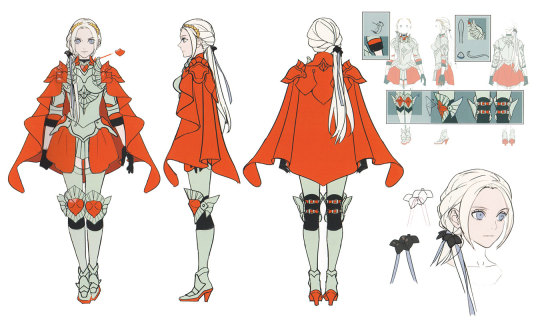
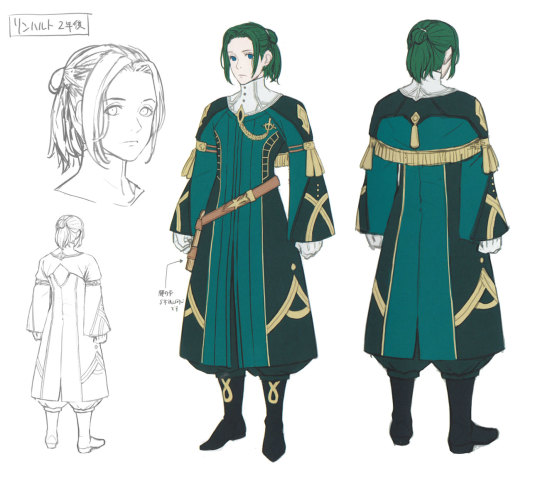
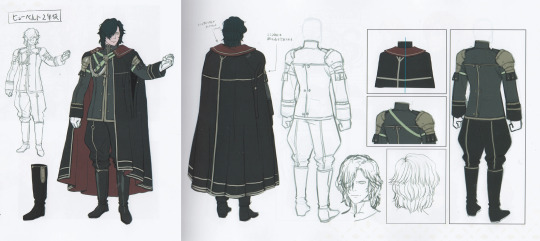
Exemplifying the supposed opulence of Adrestia, there are a lot of curves and flares in Adrestian armor and clothing. While the armor is built with a heavy emphasis on form, it does not sacrifice function. They favour the warmer colour spectrum, with some exception.
Tassles, fringe, balloon hems, and large capes are used en masse, creating a larger, tapered frame that can also be interpreted as imposing or meant to attract attention. Like the large plumage of a peacock or, well, an eagle.
They style themselves like birds, a regal distraction from their strength. (How appropriate.)
Holy Kingdom of Faerghus/Faeghus Dukedom
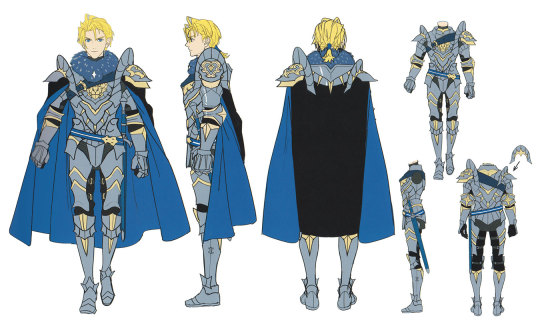
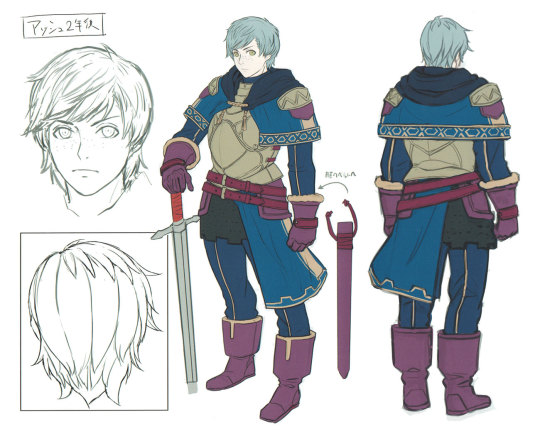
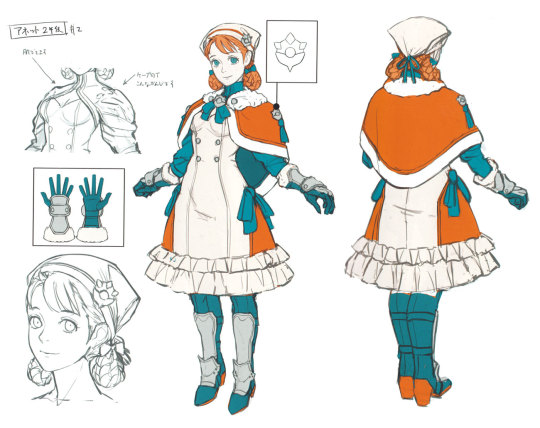
Layers, layers, Layers.
The clothing in Faeghus is entirely meant to keep you warm, and the armor is layered, sturdy, and functional. Even the mages and speed focused warriors wear layers to protect themselves from the elements, usually following the cooler colour spectrum.
Accessories and jewelry are typically simple - likely a nod to the poverty of the country itself and a focus on knightly culture - and most of the catching details come in the form of colour and the way the layers are implemented.
Also, very important, furs!! Like the manes of lions, nearly all of the noble characters hailing from Faerghus in Three Hopes wear some form of fur. (Sylvain is the only exception to this rule, as he wears a scarf instead.)
Leicester Alliance/Federation
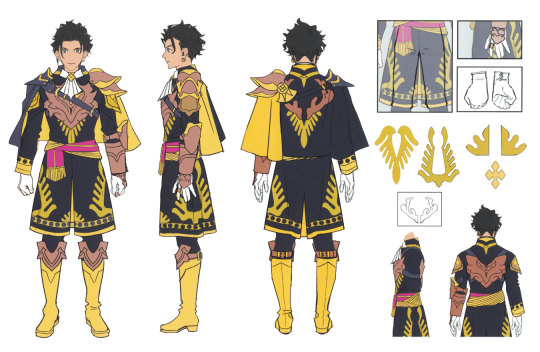
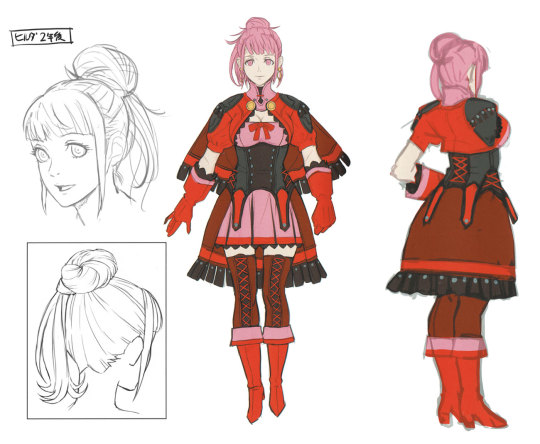
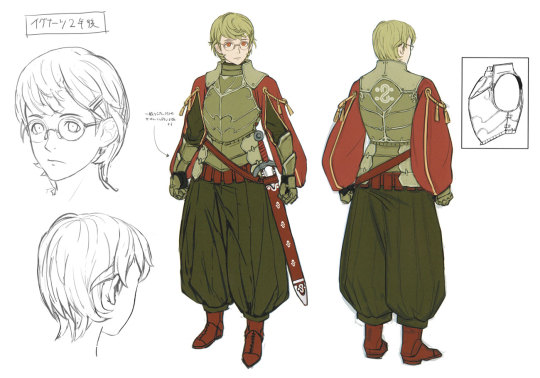
Leicester has very little in the way of cohesive clothing design. That is, however, because there is a heavy emphasis on form and ease of movement.
The armor is typically light, if available at all, and is comfortably located primarily around the chest. Clothing is loose and airy, a physical representation of the city-state's very fluid nature.
As for the colours, they are vibrant and colour a wide range of the spectrum, not totally centered around one particular side - another nod to their unorthodox standard of living. Spots, eye-catching patterns, and long fluid lines -- that's the Golden Deer for you.
Duscur, Brigid, and Almyra
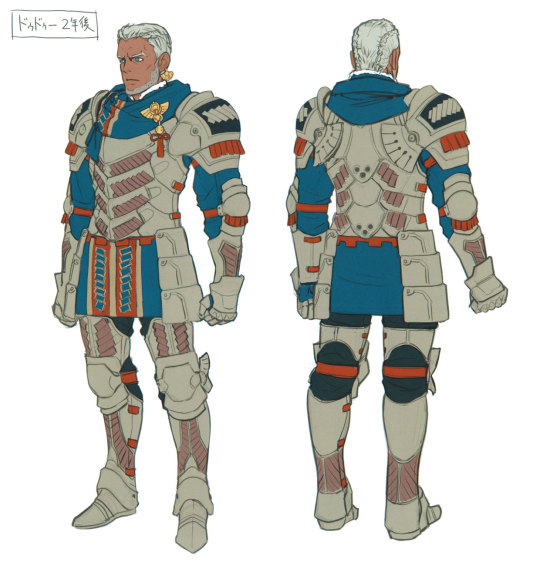
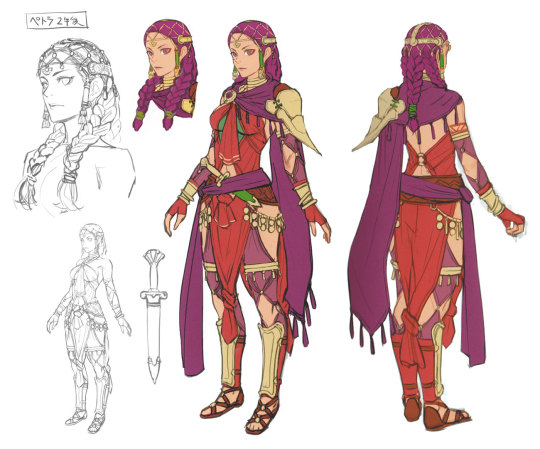
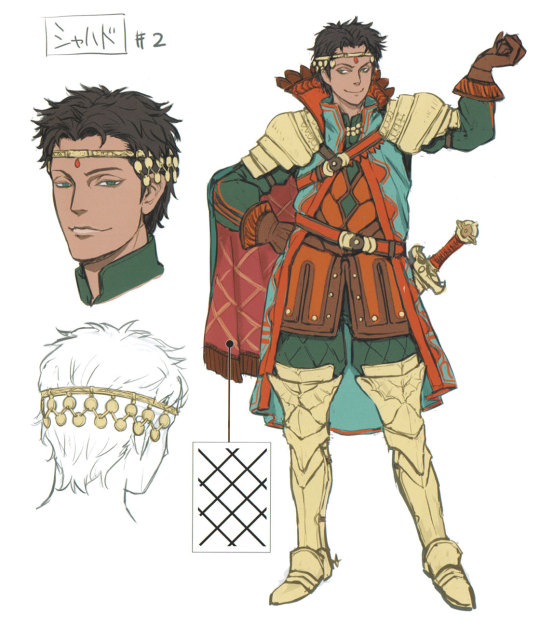
So, it took some digging, but I believe a lot of the basis for these three specific places is heavily borrowed from African, Celtic/Hawaiian, and Persian cultures respectively.
Using Dedue as the basis, Duscur style appears to be very much inspired by a mix of the ancient Nubians - particularly the Kushites - and the ancient Egyptians. Focusing mainly on the golden or potentially copper adornments and textiles he wears, I imagine their style was heavily focused on mixing patterns with a wide array of colour. (Dedue mixes that alongside Faerghus-style armor and layering, a very good example of character-driven character design.)
At first, I had assumed Brigid had more of a Hawaiian leaning due to a number of factors concerning Petra specifically, how the location is a tropical archipelago historically sought after for resources/colonization by foreign armies, and a lot of... other less than savoury historical tidbits. But, after some research, I discovered a lot of Celtic inspirations as well! Flowing clothing with form fitted areas only where necessary, tattoos around the arm and upper back, golden neck rings and bangles, and elaborate hair braiding styles are the name of the game on Brigid.
Almyra is, almost incredibly so, inspired by the ancient Persian (Achaemenid) Empire -- an empire known for its warriors and its lustre. So, you know what that means. Gold. Gold everywhere. But only elite warriors (or royalty, in the case of Shahid and Claude) use gold in their armor, so for a lower soldier, iron and bronze work best. Natural colors like yellow, orange, and green are commonly used for their loose and flowy clothing, normally accented by deep browns, black, and white linens. Like the Duscur people, they too use complex patterns and dyes. Boots and shoes are sometimes curved at the tips, but greaves are not. Head accessories range from headwraps to turbans to tiaras and diadems.
#fe3h#few3h#midday thoughts#fire emblem#adrestian empire#holy kingdom of faerghus#leicester alliance#duscur#brigid#almyra#character design#art analysis
106 notes
·
View notes
Text
Meeting her || H.S
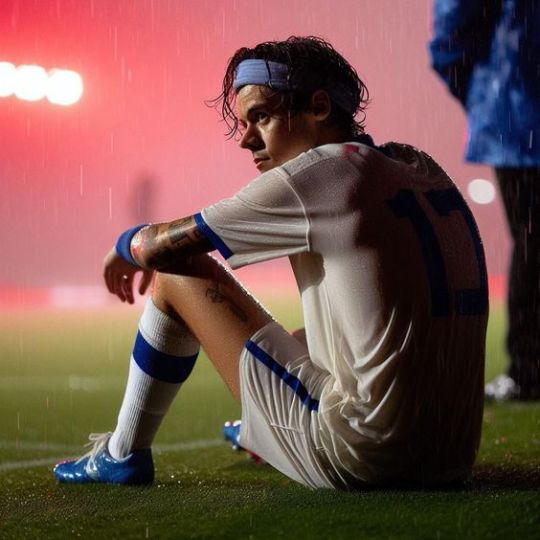
Author's note: The following piece is based on The Golden Boy one short from earlier in the year. This story will be how Harry and Y/N met. This took place before the World Cup . This is going to be a three-part story! This is part one. I hope you enjoy! The next part will have smut. Let me know what you think
PS: these IA pictures are getting out of hand.
masterlist
word count: 5.1K

As the autumn leaves danced in the crisp Manchester breeze, Y/N found herself lost in the beauty of this new city. Having recently moved here, her life felt like a blank canvas waiting to be painted with new experiences and adventures. One such adventure awaited her on a chilly evening, as her friend Emma invited her to dinner with her new boyfriend, Harry.
They first met in college during their second year. Y/N got invited to her first party but didn't know anyone. Everything turned around when Emma bumped into her in the kitchen. As the years went by, their friendship got stronger. But when Y/N switched her major to art, things took a turn. Emma didn't like the decision and started keeping her distance.
Y/N came back to Manchester after spending nearly a year in Italy. During her time there, she learned a new way to paint and work with ceramics. Even though her family was closer, she felt a bit out of place, like a foreigner, in her own native country.
One evening, as the sun dipped below the horizon, Y/N's phone buzzed with a message notification and a follow request on Instagram from Emma. Curiosity piqued; Y/N opened the app to find a warm greeting from her old friend. Emma had just learned that Y/N was back in town and was eager to reconnect and catch up on all the happenings since their last meeting. Ever since, they've been regularly meeting up for lunch dates, dinners, and various events.
Emma had been excitedly telling Y/N about Harry for weeks, and tonight was the night she was going to meet him. She kept going on about how he was a professional football player, having just joined Manchester United, and how his salary was sky-high, potentially making him extremely wealthy. Emma was evidently proud of this and made sure to let Y/N know, almost bragging about it.
They met at a cozy, dimly lit restaurant, where the aroma of delicious food filled the air. Emma was beaming with excitement, introducing Y/N to Harry as he greeted them with a warm smile. He was handsome, with kind eyes that seemed to reflect his genuine personality.
"Y/N, this is Harry," Emma said enthusiastically.
"Nice to meet you, Harry," Y/N replied with a friendly smile, extending her hand for a handshake.
"The pleasure's mine," he responded politely. "I've heard that you're an artist."
Y/N nodded shyly, "Yeah, mostly into paintings and ceramics."
“Anything that we might have seen?”
"Nothing. She's just a beginner, honey," Emma interrupted before Y/N could respond. "She just returned from Italy from picking up a new skill, hoping it might help her sell and turn a profit. You know how it is in the art world – always searching for that breakthrough.”
Y/N felt a momentary offense, a twinge of embarrassment sweeping over her. Not everything Emma had said was entirely accurate. While it was true that everyone aspired to a breakthrough, Y/N had already experienced one, prompting her journey to Italy. Having been invited there, she returned to Manchester with a renewed focus on opening her first gallery. Whispers of her name began circulating in the corners of the art world.
"Fortunately, Harry has already had his breakthrough," Emma added before taking a sip of her martini.
Emma's chatter mostly revolved around Harry's career, the glamorous lifestyle associated with professional football, and the immense potential for wealth. While Harry remained modest and humble about his achievements, Y/N could sense a hint of discomfort in his eyes.
Y/N was someone who valued depth in conversation, she yearned for more than just the superficial. Emma's constant emphasis on Harry's financial prospects was getting on her nerves, but she held her tongue, not wanting to jeopardize her friendship. It was rare for her to have friends, and she didn't want to ruin this budding friendship.
Throughout the evening, she observed Harry, realizing that he was a genuinely kind and down-to-earth person. He seemed uncomfortable with the focus on his financial success, preferring to discuss other aspects of life. Their conversation flowed naturally when they discussed their interests, hobbies, and favorite books.
As the night progressed, Y/N found herself connecting with Harry on a deeper level, appreciating his humility and kindness. Despite the initial annoyance caused by Emma's bragging, she discovered a potential friend in Harry—one who valued genuine connections over monetary gains.
"So, how was Italy? Is it everything that people say?" Harry inquired, his curiosity evident. Having not yet ventured outside the country, most of his experiences were rooted in local settings, particularly in the realm of his games. Eager to hear about Y/N's international adventure, he leaned in, genuinely interested in the tales she might share about the enchanting country he had yet to explore himself.
Y/N smiled, taking a sip of her drink before launching into her narrative. “It is everything and more. The art, the history, the landscapes – it's like a dream. I ended up indulging in the most amazing pasta dishes. And the art is in every corner.”
Harry's eyes widened with interest, "Really? What kind of art did you see?"
Y/N's enthusiasm bubbled as she shared, "Everything from Renaissance masterpieces to contemporary street art”.
As the evening came to a close, she felt a sense of contentment. She had made a new friend in Harry, someone who shared her appreciation for genuine conversations and meaningful connections. Little did she know, this chance encounter would mark the beginning of a beautiful friendship that would enrich her life in more ways than she could have imagined.
Throughout the week, Emma continued to invite her to various events, eager to integrate her into her social circle. One evening, she invited Y/N to attend a football game where Harry would be playing. Y/N was genuinely excited about the prospect of watching a live game and supporting Harry, but Emma's comment about dressing up and putting on makeup stung.
"You should definitely come to the game! It's going to be so much fun. Dress up a bit and maybe put on some makeup—you never know, you might catch someone of Harry's caliber," she said with a wink, attempting to make it sound like a lighthearted joke.
Y/N forced a smile, masking the hurt she felt. It was clear Emma was implying that Harry was out of her league or that she needed to "improve" her appearance to even be in the same league as her or him. She wasn't confrontational by nature, so she simply replied, "Thanks for the invite, Emma. I'll see if I can make it."

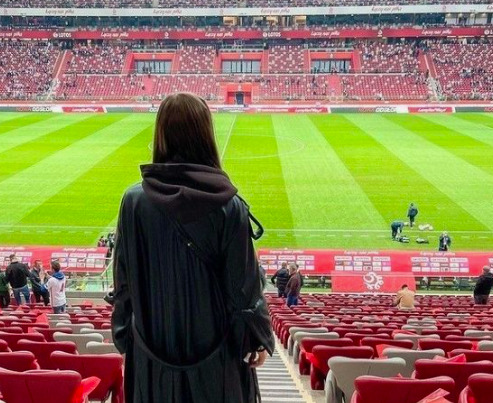
As the day of the game approached, Y/N debated whether to attend. The comment had left a lingering discomfort, making her question if she should subject herself to such superficial judgments. But her curiosity to watch the game and support Harry won in the end.
On the day of the game, she wore a casual yet presentable outfit, wanting to feel comfortable and confident in her own skin. She met Emma at the stadium, where she greeted her with excitement.
“I'm so glad you made it! This is going to be amazing," she exclaimed.
“Yeah, I'm looking forward to it," Y/N replied, attempting to infuse her response with enthusiasm, though beneath the surface, nerves churned. Anticipation mingled with apprehension as she contemplated the upcoming interaction. Y/N couldn't shake the memory of previous encounters, where backhanded comments and thinly veiled compliments had become a common thread.
As they took their seats, the atmosphere in the stadium was electric. The crowd's energy was infectious, and she found herself caught up in the excitement of the game. Watching Harry play was impressive—his skill and passion for the sport were evident.
Amidst the cheers and celebrations, Emma leaned over and said, "Isn't he amazing on the field? Imagine being with someone like him."
Her words struck a chord, reminding Y/N of the shallow perspective she seemed to have about relationships. She chose to focus on the game and cheer for Harry, pushing aside the hurt she felt. Deep down, she knew she deserved genuine connections and friendships that weren't based on appearance or someone's profession.
As the game ended and they made their way out of the stadium, she appreciated the experience and the opportunity to support Harry. However, she also realized the importance of surrounding herself with people who valued her for who she was, rather than making her feel inadequate or lesser than because of societal standards or external perceptions.

She continued to focus on her art, pouring her heart and soul into the canvas as she prepared for her upcoming art show. Emma's persistent invitations and comments had left a mark, and she found solace in the therapeutic strokes of her paintbrush. To protect her mental health and maintain her sense of self-worth, she began gently declining Emma's invitations and started distancing herself from her.
One afternoon, while heading to the art supply store, she unexpectedly crossed paths with none other than Harry. Her hair was up in a messy bun, glasses perched on her nose, and she was wearing baggy clothes slightly adorned with paint stains. She greeted him with a warm smile, surprised yet pleased to see him.
"Harry! Fancy running into you here," she said, a genuine smile lighting up her face.
"Hey! How have you been?" he responded, his friendly demeanor putting her at ease. Sporting athletic attire, he appeared in the midst of post-run casualness, on his way back to his apartment.
"I've been busy with work, preparing for an art show. It's been quite hectic," she explained.
"That sounds amazing! An art show? I'd love to see your work," Harry exclaimed, genuinely interested.
"Sure! You and Emma are more than welcome to come. It's on Saturday evening," she extended the invitation, acknowledging his enthusiasm. Including Emma felt like the courteous thing to do, although she harbored no intention of having her presence at the event.
"Where are you off to?" Harry inquired, his eyes drawn to her appearance and the sizable tote bag slung over her shoulder. He found the sight rather adorable. Harry admired her confidence and the unique way she expressed herself. While he hadn't seen her art yet, he was convinced that if it reflected even a fraction of her personality, it would undoubtedly be incredible.
Curiosity sparked in his eyes as he awaited her response, eager to understand the purpose behind the tote bag and the destination that had captured her attention on this particular day. The genuine interest he took in her pursuits was evident, a testament to the budding connection between them.
"I'm headed to the supply store. Ran out of a few things in the middle of a painting session," she explained, a hint of frustration in her voice. Having to cut her creative session short was always a predicament, leaving her feeling somewhat scattered. "That's why I look like such a mess," Y/N felt compelled to clarify, a touch of self-consciousness in her admission.
"Mind if I tag along?" Harry inquired, his reluctance to head to his apartment evident. The idea of being alone didn't appeal to him, and his living space still carried the lingering feeling of belonging to someone else.
"No problem. I just hope it won't be too boring for you," she said, a sudden nervousness creeping in. It felt akin to introducing a boyfriend to her parents, as he was about to witness a small yet intimate aspect of her life—her painting ritual. Despite the nerves, a giddy excitement bubbled within her. Rarely had someone shown enough interest in her work to accompany her in such moments.
As they strolled, they exchanged stories about their lives—his experiences with football, her passion for art, and the challenges and joys they both faced. Harry shared the excitement and pressure of being a professional athlete, and she talked about the joys and struggles of being an artist.
And Harry asked with genuine concern, "I noticed you've been a bit distant lately. Is everything okay?"
She hesitated for a moment, debating whether to share her feelings. But seeing his kind and understanding demeanor, she decided to be honest. "To be honest, Emma's comments have been bothering me. It felt like she was implying that I'm not good enough” Y/N shook her head, attempting to banish the same thoughts that had haunted her for years. "Or maybe I just misinterpreted her words," she mused, a flicker of uncertainty lingering in her mind.
Harry's eyes softened, understanding the weight of her words. "I'm so sorry you felt that way. Emma can be a bit... oblivious at times.”
His words warmed her heart, reassuring her that true friendships were built on understanding and mutual respect.
"We're here," Y/N announced, swinging open the door of a small but charming store. "Hi, George!" she greeted, waving enthusiastically to the elderly man stationed behind the counter at the back.
"Ms. Y/L/N! Good to see you! How's that collection coming along?" George, a familiar face and one of her most significant suppliers, recognized her immediately. He had even gone the extra mile to order specific brushes and paints for her, a testament to his belief in her talent.
"Oh, it's going!" Y/N chuckled, making her way to the paint aisle. "This is my friend Harry, George." Harry beamed, waving like an excited child being introduced to a stranger.
"Mr. Styles! Number nine in Manchester, right?" George exclaimed, recognizing him. "Great season you're having! It's good to have you."
"Thank you," Harry responded shyly, still adjusting to being recognized and receiving compliments from strangers.
"You're not going to swap me for Harry, are you, George?" Y/N teased as she bent down to reach for spatulas and sponges on the bottom shelf.
"Never. Still my favorite," George assured, prompting chuckles from both Harry and Y/N as they continued their joint venture, collecting items from Y/N's list and heading towards the checkout.
As Y/N gathered her art supplies, Harry couldn't help but admire the quaint charm of the store. It was filled with the rich scent of pigments and the subtle aroma of wooden easels. The artistic ambiance enveloped them as George continued to chat with Harry, discussing his recent successes in Manchester.
As they bid farewell to George, the doorbell chimed, marking the end of their visit. Stepping back into the bustling street, Y/N couldn't help but feel grateful for the support she received, not only from her favorite art supplier but also from Harry, who had ventured into her world with genuine interest and a bright smile.
"That was wonderful. Thank you for taking me," Harry commented warmly, carrying Y/N's tote bag through the lively streets. The cityscape buzzed around them, a backdrop to the shared experience they had just enjoyed.
Y/N smiled in response, her eyes reflecting gratitude. "Thank you for coming. It means a lot," she admitted, a subtle vulnerability in her tone. "No one has ever accompanied me to these sorts of things."
Harry's smile broadened, understanding the significance of those words. The weight of being the first to share in a part of Y/N's world tugged at his heartstrings. As they walked side by side, the city lights flickering overhead, an unspoken connection blossomed between them.
They found themselves enveloped in a comfortable silence, the echoes of their shared laughter still resonating in the air. The streets, alive with the rhythm of urban life, seemed to dance to an unspoken melody that mirrored the newfound understanding between Harry and Y/N.
Harry accompanied her all the way to her apartment, insisting on ensuring her safe arrival.
"I'll see you at the art show," Y/N said, her voice carrying a mixture of anticipation and gratitude. She gave him a quick but warm hug before disappearing into the foyer of the building. The promise of their reunion at the upcoming art show lingered in the air, a shared moment they both looked forward to. As Y/N disappeared from view, Harry couldn't shake the feeling of contentment. The day had been filled with meaningful conversations, different from his usual exchanges with his girlfriend.

On the night of the art show, the venue was buzzing with people who had gathered to appreciate and celebrate art. The atmosphere was vibrant, filled with an array of colors, emotions, and creativity. She was both excited and nervous, eager to share her work with others.
Not only were her paintings displayed on the wall, but her ceramics pieces adorned the space as well.
As the evening progressed, Y/N noticed Harry and Emma arriving, accompanied by a couple of Harry's friends. She greeted them warmly, hoping for a pleasant evening. However, it didn't take long for the mood to sour.
Emma's disapproving looks and hostile demeanor became evident as she roamed around the exhibition. Her discomfort seemed to intensify with each piece she viewed, as if she couldn't bear to see Y/N in the spotlight.
"What am I even looking at?" Emma whispered to Harry as they stood amidst a sizable crowd gathered around one of Y/N's largest paintings. "And why is everyone gawking? It's not a big deal; everyone can do it." Harry stayed silent; his attention fully absorbed by the intricate details of the artwork.
"Stop it," Harry gently pulled her hand, attempting to hush her down. "You're being rude." However, he couldn't deny that Y/N's creation was something truly unique. The canvas held an amalgamation of colors and emotions that seemed to dance and intertwine, capturing the essence of her artistic vision.
As the crowd marveled at the masterpiece, Harry couldn't help but feel a sense of pride for Y/N. Her work, a reflection of her passion and creativity, had garnered the attention and admiration of those present. He admired the way she fearlessly poured herself into her art, creating something that not only spoke to him but resonated with a broader audience.
Despite Emma's dismissive comments, Harry recognized the significance of Y/N's talent. He hoped that, with time, Emma might come to appreciate the artistry that captured the attention and imagination of so many.
“Let’s go. Why are we even here?” Emma turned to Harry and his friends, “She is not even that close of a friend. She is just a struggling artist”.
Unbeknownst to Emma, Y/N stood silently behind her, absorbing every single word that had slipped from Emma's lips. The gallery buzzed with the murmur of impressed onlookers, blissfully unaware that the subject of their discussion was right there, an invisible presence in the sea of admirers.
Y/N's heart sank at Emma's dismissive comments, her vulnerability exposed to the unintended audience. The weight of those words settled on her shoulders, adding a layer of discomfort to the pride she felt for her creations. Yet, she chose to linger in the shadows, absorbing the unfiltered opinions that echoed in the gallery space.
“Emma, that’s enough” Harry interjected, his voice carrying a mix of anger and concern.
As Emma turned around, her gaze met Y/N's, and the air grew thick with an unspoken tension. Y/N, having overheard every word of Emma's critique, stood there, a silent witness to the candid commentary. The sudden realization that Y/N had been present all along cast a veil of nervousness over Emma.
Caught off guard, Emma's eyes widened, and her cheeks flushed with a mixture of surprise and embarrassment. The vibrant atmosphere of the gallery seemed to dim momentarily; the weight of the words exchanged lingering in the space between them.
Ignoring him, Emma cleared her throat, her voice sharp and accusatory, "You've been avoiding me, Y/N. I don't appreciate being treated this way, especially after everything I've done for you." Caught in the discomfort of the moment, Emma felt the need to assign blame. Admitting fault was inconceivable, especially in front of Harry and his friends; maintaining a positive image was paramount. Emma couldn't afford to be perceived as a negative force, and so, the instinct to shift responsibility to another party took hold. The desire to preserve her reputation and uphold a facade of positivity outweighed the need for genuine self-reflection.
Y/N tried to maintain her composure, choosing her words carefully. "I've been busy preparing for this show and focusing on my art. I never meant to make you feel ignored."
Emma's face twisted into a bitter expression, and she snapped, "You think you're so special with your art, don't you? No one cares, Y/N. I stopped talking to you in college because of these same reasons. You need to realize that you made a mistake by changing majors. Art is not going to feed you.”
The threat stung, hitting close to home. Y/N took a deep breath, trying to stay calm and collected despite the rising humiliation. "Let's discuss this later, privately."
She was relentless, determined to exert her dominance. "No, we'll discuss it now. Harry, tell her she's out of line."
Harry, torn between loyalty and what was right, looked conflicted. "Emma, maybe now's not the best time—"
Emma cut him off, her voice venomous, "Oh, so now you're siding with her? Fine, have it your way."
She stormed off, leaving Harry visibly troubled and Y/N mortified in front of his friends and other attendees. She wished the ground would swallow her whole, but she reminded herself that she had done nothing wrong.
Harry approached her, his eyes filled with apology. "I'm so sorry. She was completely out of line."
She forced a small smile, trying to brush it off. "It's alright, Harry. Let's not let this ruin the evening."
Deep down, she knew she deserved better than Emma's toxic behavior. As the night unfolded, she chose to focus on the genuine appreciation she received for her art, determined to rise above the negativity and continue pursuing her passion and genuine friendships.
After the tumultuous confrontation with Emma, the art show continued, and she tried her best to immerse herself in the joy of sharing her work with appreciative art lovers. The support and admiration she received from the attendees helped ease the sting of Emma's outburst, allowing her to refocus on the success of the evening.
As the night came to a close, she couldn't help but feel a sense of accomplishment. Several of her pieces had been sold, and the positive feedback had boosted her confidence as an artist. She was both proud and grateful for the experience.
As she started to wrap things up and close the gallery, she noticed Harry waiting outside. His presence was a comforting sight after the rollercoaster of emotions she had endured throughout the evening.
"Hey," she greeted, trying to offer a genuine smile despite the lingering discomfort.
"Hey, congratulations on a successful show," Harry said warmly, genuinely pleased for her.
"Thank you. It means a lot," she replied, feeling a sense of relief knowing that the worst was behind her.
"Look, Y/N, I'm really sorry about Emma's behavior. That was completely uncalled for," Harry apologized again, sincerity in his eyes.
She appreciated his concern and understanding. "Thank you, Harry. I know you tried to intervene, and I appreciate that."
Harry nodded, and then a soft chuckle escaped his lips. "I don't know about you, but I'm starving. How about we grab a bite to eat?"
A pang of hunger reminded her that she had skipped dinner in the whirlwind of the art show. "That sounds perfect. Let's go."
They found a nearby café and sat down, the atmosphere much more relaxed and pleasant than earlier in the evening.
Harry's presence was a balm to her earlier distress, and she was grateful for his kindness and understanding. Despite the events of the night, she felt a genuine connection with him, appreciating the way he had handled the situation and his willingness to stand by her.
As the night came to a close, and she bid Harry farewell, a mix of emotions swirled within her. There was a flutter in her heart, an undeniable attraction that had grown stronger throughout the evening. She had started to like Harry more than just a friend, and it made her nervous.
Y/N knew the reality of the situation. Harry was Emma's boyfriend, and pursuing anything beyond friendship with him would be a betrayal of their relationship. Loyalty and respect were paramount, and she wouldn't compromise those values for her own desires. She couldn't deny the chemistry and connection she felt, but she also understood the importance of boundaries and staying true to her principles. It was a delicate balance between her burgeoning feelings and her commitment to doing what was right.

In the following days, she wrestled with her emotions, trying to put distance between her heart and the potential complications that could arise. She focused on her art, pouring her feelings into her creations, finding solace in the brushstrokes that paint her emotions on the canvas.
That was until one day when she found herself at home, and the intercom unexpectedly rang.
"Ms. Y/L/N, there's a Harry Styles wanting to see you," the voice on the other end announced. Shock rippled through her; it had been a few weeks since she had last seen him. Y/N had purposely kept her distance, fully aware of the feelings that had developed within her.
"Yeah, let him in," she replied, a mix of anticipation and nervousness lingering in her voice. As she unlocked the door, she settled back into her painting, attempting to distract herself from the whirlwind of emotions.
The front door creaked open, and soon, a soft knock echoed through the space. "Y/N?" Harry's rough voice called out, filling the room with a mixture of familiarity and uncertainty.
"In here," Harry heard from the foyer, prompting him to close the front door behind him. He followed the sound of her voice, traversing through the space until he finally located her. There she was, sitting on the wooden floor with legs crossed, her hair fashioned into a bun, and wearing glasses that complemented. her.
Harry cradled a warm brown paper bag, emanating the aromatic allure of Chinese cuisine. He knew of this particular restaurant that served delectable dishes, a tantalizing choice for his unhealthy food cravings. Eager to share this delightful find with Y/N, he approached her with a welcoming smile, lifting the bag in presentation.
"I brought some food," he announced, the tantalizing aroma wafting from the bag.
Curiosity sparked in Y/N's eyes as she inquired, "What is it?"
"Chinese," Harry nervously replied, hoping that his culinary choice would meet her approval.
"Good choice," Y/N commended, setting aside her brush and rising from the floor. It was at that moment that Harry couldn't help but notice her attire – a pair of overalls, worn with an easy casualness. However, the revelation didn't stop there; the absence of anything beneath the overalls exposed the side of her breast, a subtle detail that heightened the air of intimacy in the room. The vulnerability of the moment lingered, as did the tempting aroma of the Chinese delicacies. “Are you alright?”
“Y-yeah” he cleared his voice, “just hungry” Harry didn’t know if he meant for the meal or fo the sudden urge that he had to feel her breast. He recognized that Y/N had distanced herself, a mirror to the sentiments he harbored toward her. The desire to be close to her lingered within Harry, fueled by a genuine fondness. He admired her, not just for her presence but for the profound connection that blossomed in their conversations.
Harry appreciated the way she listened, her attention genuine and unwavering. In those moments, he felt more than heard; he felt understood on a level that transcended the superficial. Y/N held the key to unraveling his thoughts and emotions, creating a unique bond built on mutual understanding and genuine connection.
"How have you been?" Y/N inquired, taking the lead as she guided Harry towards the living room. The air was charged with a mix of anticipation and a hint of vulnerability. "I saw your match last week. You played really well."
Harry's response held a touch of concern, reflecting the echoes of unanswered messages that lingered between them. "I haven't heard from you since your art show. I thought you were mad at me," he confessed, revealing the worry that had gnawed at him.
"I just thought it would be best to gain some distance between us," Y/N explained, her movements deliberate as she set plates on the coffee table. The unspoken complexities of their connection hung in the air, entwined with a hint of secrecy. "I-I am sure that Emma wouldn't like to know that we are spending this much time together."
As soon as the word 'distance' left her lips, a palpable tension surged through Harry. Panic set in, triggering a rapid response. He hastily placed the bag down, reaching out for Y/N. In a swift motion, he grasped her wrist, pulling her towards him with a sense of urgency.
"Harry," Y/N cautioned, her hand pressed against his chest, attempting to maintain a boundary. Yet, defiance glinted in his eyes as he refused to relent. He freed her wrist, wrapping an arm around her waist while the other found its place behind her head, gently pushing her closer.
"No," he declared, the word hanging in the charged atmosphere. His lips met hers with a hunger that spoke volumes, a fusion of longing and passion. Initially resisting, Y/N succumbed to the intensity of the moment, reciprocating the kiss with an equal fervor. The living room became a stage for a silent exchange, where unspoken emotions and lingering desires found expression in the fervent embrace of their lips.
“Yeah, that’s exactly how I’d imagined it”

QUESTIONS OF CHAPTER (answer below) Do you condone Harry and Y/N’s actions? Do think Emma deserves get cheated on?
#harry#harrystyles#harryimagine#harryimagines#harrystylesimagine#harrystylesimagines#harrystylesfanfic#harrystylesfanfiction#harryfanfic#harryfanfiction#harryfic#harryxyou#harryxy/n#harryx reader#harry x you#harry x oc#harry styles x you#harry styles x y/n#harry dabble#harrystyles dabble#harry styles x reader#harry styles x oc#harry love story#harry styles love story#harry styles fanfic#harry imagine#harry styles drabble#harry styles smut#harry styles prompt#harry prompt
184 notes
·
View notes
Text
On Ibuki, Identity, And Establishing A Character
With Ibuki being a new character, there’s a lot of potential for where he goes – but at the same time, Enstars has established quite a bit in the time since release. Below, I’ll jot down my feelings in regards to his identity.
When it comes to his identity, Enstars in-text and announcements (such as 4piece’s Final Ceremony) calls him half-American, half-Okinawan. This alone stands out, because he isn’t being associated with the entire country of Japan, but with a specific region. This is an unusual way for Enstars to refer to any of its characters, with the closest any character being to this sort of region-based identification character being Mika.
Mika is one of the few characters whose regional background is specified, with him being from Kansai – but even still, it doesn’t compare to Ibuki. Mika’s character description makes no mention of this, nor does he address himself as such. He is classified by his nation, not his specific city/region of origin, meaning that he is considered Japanese, not explicitly called Osakan.
When it comes to characters whose nationalities and/or ethnicities are mentioned, there is Adonis (“A young idol that came to Japan from the Middle East” <- !!-era character description; “I was born to a Japanese mother and a foreign father…” <- !!-era self description) and Aira (“He is a quarter French…” <- character description).
But with the characters above, who are each half-Japanese, the term Japanese or Japan is used. They don’t have a region specified the way that Ibuki does, so we can see that this isn’t something that Enstars is implementing on account of Ibuki being half-American.
From his description alone, he’s already distinct because he doesn’t mention Japan at all, but has no problem mentioning Okinawa, so we already see a distinct and unique relationship with Japan.
Then, there’s also how he addresses himself. In his Idol Story 1, he explicitly calls himself uchinaanchu (うちなぁんちゅ) (In the voiced video for the Idol Story on the Youtube channel, this would be around the 0:44 mark). This is a term used by Ryukyuans, or Indigenous Okinawans, meaning that his relation to Okinawa isn’t just a matter of him being born there.
To elaborate on this, what I mean is that the term “Okinawan” on its own isn’t just used to describe Indigenous Okinawans, but in general, anyone who is a resident of Okinawa, or has some history in Okinawa (such as spending their youth in Okinawa). In English-speaking spaces, I personally find that people use the term Okinawan and Ryukyuan interchangeably, but there are certainly also people who use the term “Okinawan” by the other descriptions that I provide above. With Ibuki though, we aren’t seeing that he calls himself Okinawan specifically because of the circumstances of his birth – his ethnic background plays a role in his self-identification as well.
To summarize: he isn’t a guy who happens to have ties to Okinawa – he is specifically Indigenous to the Okinawan region.
Most importantly, when it comes to his relationship with his identity, we see that he regards his identity positively.
In Idol Story 1, Ibuki makes a comment about being discriminated against on the basis of being half-American, half-Okinawan (where he specifically uses the term uchinaanchu). Without getting too far for now into how Enstars uses this as a joke which risks underplaying the discrimination that marginalized groups face, we do see that Ibuki is familiar with the way that the groups that he belongs to are perceived, and condemns this discrimination.
There’s a comment that Ibuki makes in Idol Story 2 towards Tetora – “You shouldn’t think of yourselves as the standard for everything~, Mr. Japanese.” He pokes at how cultural ideas change with eras and places and so there is no one standard in Japan – despite its reputation as a homogeneous society – given the diversity that it has. (This does risk getting undercutted by Ibuki’s antagonistic role in the story, depending on how Ibuki’s pokings at Japanese society are depicted in Enstars from here on out.)
Ibuki’s pride is directed to both his Okinawan and American roots – his experiences in both places are valuable to him (which is going to be very important to remember later). This is consistent throughout all of his experiences – he continuously refers to cuisine and practices from both cultures without downplaying them.
What makes this especially important is that its distinct. For comparison: Rinne has a complicated relationship with the Amagi hometown due to his upbringing; Hiiro is trying to get acclimated to city-life and unlearn some of the ideas that he was raised with (though there is a lot more to say about the Amagis that I won’t get into here); Adonis deals with internalized racism as seen in his negative self-image; and Aira hasn’t made a strong claim to his French heritage since he wasn’t raised with French culture.
This is big, genuinely. His identity is not ambiguous, and he actively engages in it, which is also being directly shown in-game. But that also ties into another concern related specifically to discussions about Ryukyuans.
In the present, Ryukyuans are not a recognized Indigenous group in Japan. Instead, they are considered a sister group to the Yamato ethnic group, which is the predominant ethnic group in Japan (90+% of Japan is stated to be Yamato, with some sources putting them as high as 99%).
As such, Ibuki’s inclusion in AKATSUKI, which presents itself as a traditional Japanese group, is currently at a crossroads – either they acknowledge the Ryukyuans as a distinct group, but not to be treated differently from the Yamato, or they consider Ryukyuans an extension of the Yamato.
The latter is a concerning road to take given the assimilation of the Ryukyuans. When talking about assimilation, we usually talk about ethnic cleansing, which involves the prohibition of cultural practices or harm done to practitioners prohibiting them from engaging in their cultures. However, a part of assimilation that isn’t often discussed is absorption – as in, the targeted culture’s practices are deemed the practice of the dominant culture, thus denouncing or downplaying their claims to certain cultural ideas, if not all of them.
We see this especially in discussions about the Ryukyuan languages, to give a real-world example. When it comes to the prohibition of practices, in the Meiji era, to promote the use of Japanese and dissuade the use of the Ryukyuan languages, the language of instruction in Okinawan schools was exclusively Japanese, and use of any other language would be punished, usually by making the offending student wear a humiliating tag around their neck.
Then, when it comes to the absorption of practices, in the 19th century, the Ryukyuan languages were deemed dialects of Japanese. This strips the Ryukyuans of the ability to use their practices as a point of distinction and proof of Indigeneity, since their practices are mislabelled to integrate them into the dominant group. In the present, most discourses I’ve seen about the dialect vs. language classification agree that the Japanese government’s use of “dialect” (方言) is derived from political, social, and cultural arguments, not linguistic ones.
And so, when it comes to AKATSUKI and Ibuki, we are running the risk of misattributing Ryukyuan culture to all of Japan. Instead of their culture being “the practice of Indigenous Okinawans”, Enstars might label it, “the practice of Japanese people living in Okinawa.”
These Japanese vs. Ryukyuan cultural comparisons continue to be of great concern in Ibuki’s writing. In Ibuki’s Idol Story 3, he mentions that he’s trying to learn about the “true Japanese style” (和風). Here, we run into concerns about what constitutes true Japanese style – and the fact that Ibuki is searching for it implies that it is something he currently lacks. Ibuki is well-versed in Okinawan culture as was mentioned above, so what exactly is the part of Japanese culture that he struggles with? I don’t think its surprising for him to have some interest in the cultures of mainland Japan, but why should that be labelled the “true Japanese style”? Additionally, he has as much reason to consider himself Japanese as he does to call himself Okinawan, but as we see above, only the latter gets used for him.
And that gets us back to the importance of “ibuki as half-Okinawan” vs “Ibuki as half-Japanese”.
(Note: I am not Indigenous. The classifications that I’m making below are not supposed to be representative of every Indigenous person ever, and are mixed between local conversations that I’ve had and global debates. Corrections and alternative perspectives are encouraged.)
To explain this, its important to note how many Indigenous groups self-identify, especially in relation to their nation-state.
Nation + Indigenous identification (Ex. A person calls themself Japanese-Ryukyuan) comes from different feelings and experiences across domains. For example, on one hand, in the legal and international dominant, the nation-state identity is what one will be referred to. The nation-state's culture is the one that a lot of children are raised in, and depending on the demographics of their area, it might be common that a parent and/or other family members will be from the dominant group, so its not wholly correct from an ethnic standpoint to reject the dominant identity. However, in other domains, the Indigenous identity still prevails. Maybe their Indigenous identity is more relevant locally, or their upbringing meant that they were sufficiently exposed enough to their respective cultural practices to build a foundational association with them. Nonetheless, its not a matter of one or the other – both identities have their place and relation (and it’s a very complicated thing to manage for people personally, not as clear-cut as I’ve put in my examples above).
Solely Indigenous identification (Ex. A person calls themselves Ryukyuan) comes from the rejection of the imposed nation-state identity – in particular, it rejects the borders that one’s respective Indigenous group was forced into. Whatever interaction there is with the dominant group – whether it be upbringing, blood ties, or extended exposure – it does not change the fact that one does not associate with the dominant group. Ultimately, the nation-state, irrespective of its legal and/or international presence, is deemed an imposed identity, not an organically originating one for those who refuse to call themselves by it.
(There are also Indigenous people who refer to themselves by solely the nation identification – I do not include this perspective because it does not relate to Ibuki specifically, but I ask that people keep it in mind when it comes to greater discussions of Indigeneity.)
For Ibuki, this is relevant because his lack of association puts him in the second category – he has never made any claims to Japan as a whole, and this is reflected in his written profile, meaning that it is something that Enstars is attributing to him, not fan interpretations.
Additionally, as seen in his interaction with Tetora in Idol Story 2, he is willing to poke at the idea of what constitutes being “Japanese”. As it currently stands with Enstars characters, there is a scale to how heavily characters associate themselves with Japan. I would personally put Aira at one end, given that he consciously makes attempts to follow norms since his appearance leads people to assume that he isn’t Japanese, leading to his complex, and I would put Rinne at the other end because for all that he enjoys the city-life, that doesn’t change the fact that he criticizes the idea of a homogeneous Japan, and he repeatedly condemns the historical treatment of his people.
I don’t think I would shock anyone if I said that Ibuki’s outlook is far more similar to Rinne’s. I also don’t think it would be shocking if I suggested that, if Rinne were to be written as Ibuki is, then it would be easier for people to see the contradiction between ideology and action.
But, as seen in Idol Story 3, Ibuki does have an interest in mainland culture. However, Ibuki isn’t unique for this – Adonis and Hiiro have a similar interest in mainland culture, yet their treatment has been vastly different. Using a Doylist lens, I’ll talk about why this is stands out to me.
As a precursor, let me note: Ibuki is still a character being established, and will take time to develop given Enstars’ medium as a gacha game, and I genuinely hope from the bottom of my heart that Enstars takes the many nuances of this situation into account – but this is unlikely given how Enstars has written racial minorities from its inception, and I don’t think its an unfair thing to voice concerns about.
In light of AKATSUKI’s mischaracterization, I don’t think its unfair to say that Ibuki’s characterization is also being “adapted” to justify his inclusion in AKATSUKI. I’m not using the term mischaracterization off the bat because I’m aware that people are going to take it in ways that I don’t intend it to, so let me explain:
Rather than thinking of it as “mischaracterization”, it would be more accurate to say that his characterization is being set up to make certain choices easier for the writing team. This has been a similar concern with Adonis’ internalized racism, given that his comments towards himself have been used to legitimize other characters’ tendency to describe him as “scary” rather than to serve his narrative and development. As such, instead of telling us anything about Adonis as a person, his internalized racism softens the discussion around racism by making it seem like racialized groups, too, find their own bodies as scary as out-groups do - which plays into racist assumptions that all racialized people consider themselves inferior culturally.
In Idol Story 3, we have Ibuki mention that he wants to find the “true Japanese style”, which Esu sympathizes with. The purpose of this scene isn’t to establish Ibuki’s motives – its to defend Enstars’ writing choice. Esu expresses sympathy, which prompts Ibuki to say that most people haven’t been understanding of his choice – but the question is who are these people? The closest we get to criticism about his choice to join AKATSUKI is Kuro and Souma’s reluctance, but even that isn’t permanent. We get throwaway lines about “people”, but never any clarification on what type of person. It’s a breaking of the fourth wall – and if we’re breaking it, lets go all the way.
People are surprised about Ibuki’s choice for many reasons, but allow me to say this – its sudden and doesn’t match up with what we’ve seen of Ibuki.
Between Idol Story 2 and VS. Audience, interacting with Keito suddenly gets him from “don’t assume what is or isn’t common in Japan” to “I need to find out what true Japanese style is.” Idol Story 3 doesn’t elaborate on this, it just puts it into plain words.
Again, as I’ve mentioned, Ibuki isn’t the first character to be interested in mainland culture. Adonis, specifically, is a friend of Souma who uses him as a reference for what is true Japanese culture. But at no point in his attempts to learn about Japanese culture does Adonis ever consider joining AKATSUKI, nor does Hiiro do the same in his attempts to learn about the city. Ibuki, despite having similar motives, is being treated is exceptionally invested. And I really want to emphasize that last sentence – there isn’t anything particularly strong or spectacular about Ibuki’s desire to learn, he isn’t written to be more determined than any other character, but Enstars expects us to see it differently.
It also doesn’t work with his character as established thus far, specifically as it pertains to character conflicts. In 4piece, we already see that Esu and Fuyume have a complicated relationship worsened by the airplane crash that took Esu’s father’s life, Kanna is burdened by the label “genius” and is unsure of how to become human, and Raika is suddenly being introduced to a society that he doesn’t understand. Ibuki has had almost as much screen time as EsuPuri, but he’s the only one to suddenly introduce a new character motivation.
At first glance, his unconstrained nature seemed to be a source of conflict given his tendency to pick fights and his easy-going nature. His mind in particular is said to be prone to swaying, and yet his resoluteness in joining AKATSUKI is unquestioned narratively from what I’ve seen. Wouldn’t other characters who know ibuki for his go-with-the-flow nature be surprised to see him give his all to a group? Instead, its being treated as something obvious that “people” need to respect.
There is some well speculation that Ibuki’s inclusion is meant to play into the ongoing idol-colonization of Okinawa in Enstars… but to be frank, connecting Ibuki to this plot point doesn’t require him joining AKATSUKI. In fact, one could argue that if Ibuki’s narrative purpose were to address this, he would be better off going solo or joining RYUSEITAI since this would give him more opportunities to address this plotline since AKATSUKI isn’t as heavily involved.
In the end, what really makes me doubtful about Ibuki’s writing is 1) the inclusion of the Rising Sun flag in the 2025 ver of “Hyakka Ryouran, Akatsukiyo” (百花繚乱 紅月夜) and 2) concerns about his upcoming solo being about his identity – specifically a feeling of lack of identity.
Firstly… I truly don’t think that you can make a claim about respecting Ryukyuan culture if you’re doing so under an imperialistic image. Remember, the Ryukyuan’s problem is that they are being mislabelled as the Yamato’s sister group, so calling their practices “Japanese culture” from an ethnicity lens has problems. Also, using the Rising Sun flag to promote Ryukyuan culture risks associating their culture with the ideology that was used to ethnically cleanse them.
Secondly, Ibuki already has an identity. Its one of his most established traits, to be clear. If concerns of fans turn out to be true and it turns out that Ibuki is insecure in his identity, then we must ask: where is this coming from? Maybe its not his ethnicity specifically that he has problems with – don’t worry, I’ll allow nuance – but as I’ve said above, none of this is what we have seen with Ibuki thus far. It feels like they’re introducing this new insecurity to poke at fans who don’t like this decision to put him in AKATSUKI – “See, you’re the exact sort of person that makes Ibuki insecure! Aren’t you awful? Really, since this is Ibuki’s choice which absolutely isn’t being influenced by anything else, it shows that you don’t have any respect for people like Ibuki who follow their dreams (even if their dream is to follow the status quo against their own wishes)!”
But there’s another thing that Enstars risks saying with Ibuki, which is that yes, he may be Okinawan, but it’s not enough for him to just consider himself Okinawan – but if so, why? Why is it necessary that he call himself Japanese from an ethnic standpoint when he has not claimed that identity nor has been given a reason thus far to do so – an identity that has been used to erase his community?
21 notes
·
View notes
Text
Cosplay the Classics: Elizabeth Montgomery in “Two”
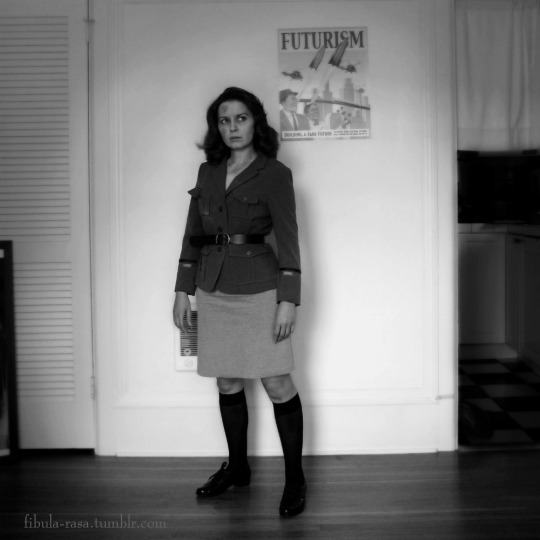
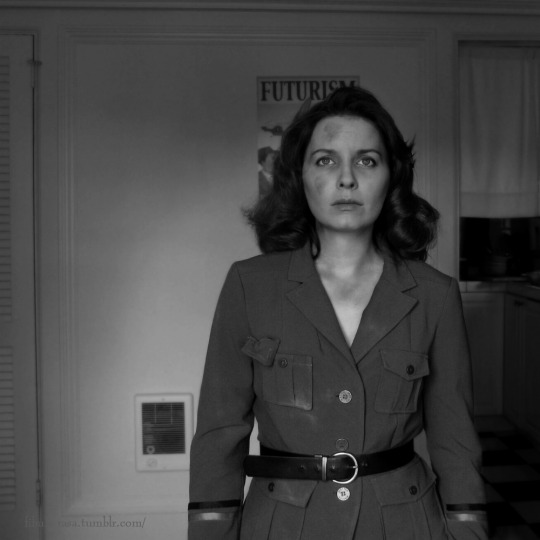
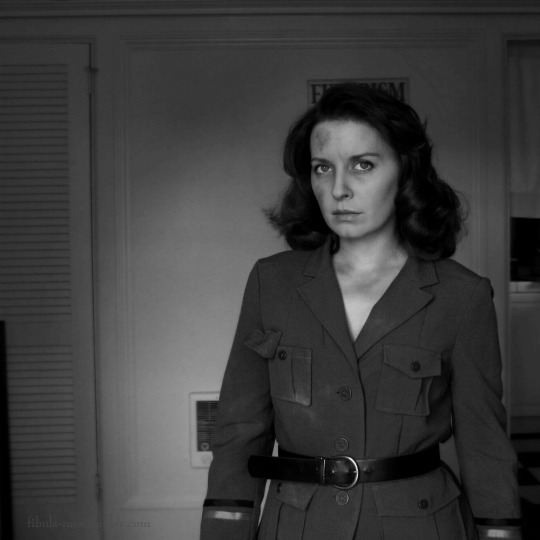
“Two” first aired on 15 September 1961 and is the first episode of the third season of The Twilight Zone. Sadly, “Two” is the only episode that features Elizabeth Montgomery.
Montgomery was nearly ten years into her professional career in 1961. She had already carved out a solid resume in television, appearing prolifically on anthology and episodic shows and occasionally stretched her legs on the New York stage. Samantha Stephens was still three years away when Montgomery took her voyage through The Twilight Zone.
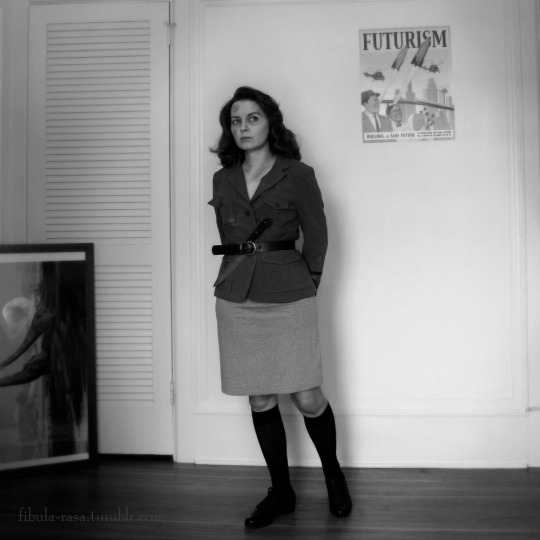
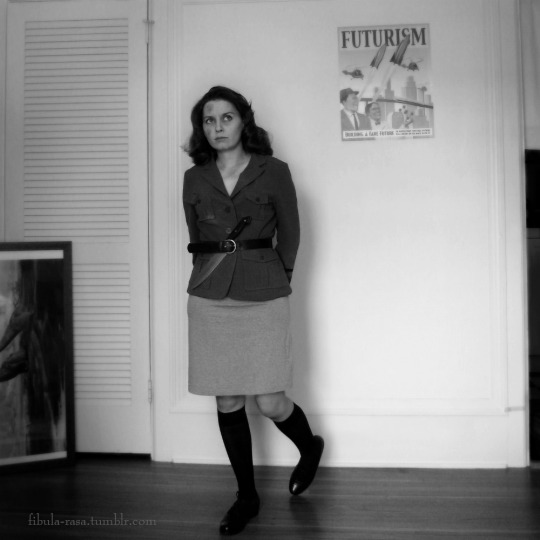
In its five seasons, The Twilight Zone was a crossroads of up-and-coming and well-established performers. “Two” paired the rising star Montgomery with Charles Bronson, who had a decade more acting experience in TV and film than Montgomery. Though Bronson was the more established star, “Two” is Montgomery’s showcase.
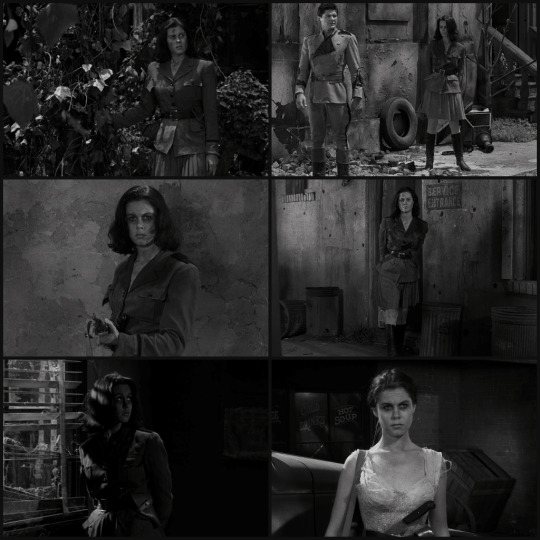
Read on below the jump!
“Two” relies on minimal dialogue throughout and notably Montgomery only has a single line spoken. The role relies almost entirely on Montgomery’s action/reaction, expression, and styling. The episode begins on Montgomery as The Woman wandering an abandoned city. The first nine minutes of the episode pass with no dialogue, with context given by visual elements and Serling’s opening narration. The entire episode takes place on a small section of city street (at the old Hal Roach studios, conveniently already in disrepair).
We learn through newspapers and magazines that this city is in The Man’s homeland, invaded by The Woman’s nation’s army. Signs of the city’s long five-year abandonment are everywhere, including full skeletons left where they fell. (The macabre element of skeletons is used sparingly across the Twilight Zone and usually in circumstances less grounded in reality than “Two,” such as “Long Live Walter Jameson” and “Queen of the Nile.”) As The Man mulls over his first encounter with The Woman a dove flies up behind him as a symbol of his genuine desire for peace. Through a variety of posters and advertisements, we learn that The Man’s homeland had a culture heavily invested in war.
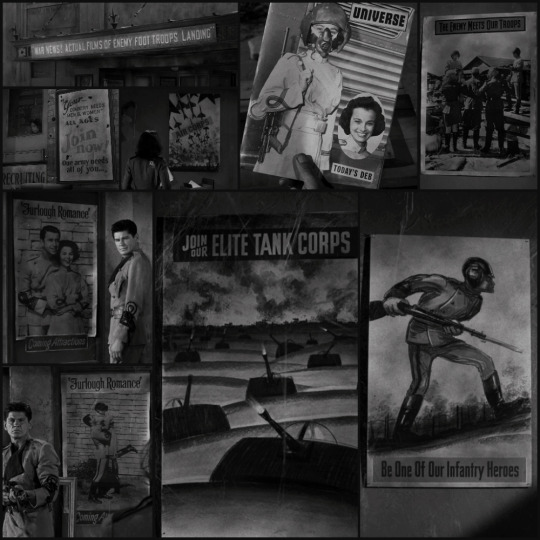
Collage of the war-related paraphernalia in “Two”
All of that is solid storytelling, but Montgomery’s acting adds an extra something. When The Woman first encounters The Man, Montgomery performs hair-trigger reactivity. Despite The Woman’s dire situation—a stranded foreigner in a decimated country with seemingly no chance to ever return home—her reluctance to trust The Man is significant. Pairing Montgomery’s wordless portrayal of these responses with the jingoistic quality of The Man’s homeland and the notable length of time that the city has been abandoned makes me feel that her feelings might not be a simple holdover of wartime hostility on her part but potentially extended trauma. Perhaps The Woman had previous awful experiences with other straggling remnants of The Man’s military, who may not have been as ready as The Man to give up wartime attitudes in spite of the war clearly being over.
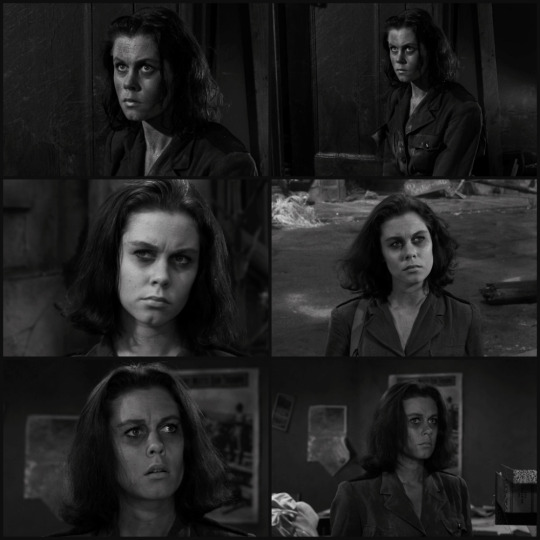
The Woman is understandably acting like a cornered animal. As the episode progresses, The Man tries to be as calculated as possible in communicating to The Woman that he doesn’t want a fight through his actions, turning his back to her, and not retaliating the third time she launches an attack on him. Montgomery, in turn, does a great job of drawing out the cornered animal characterization—alternating between curiosity, hope, mistrust, and open hostility. Montgomery’s characterization gives the role the added dimension that saves the episode from feeling too much like an overly simple fable.
Unfortunately, it’s in executing the fabular aspect of the story where “Two” falters. The opening narration by Serling specifies:
“It’s been five years since a human being walked these streets. This is the first day of the sixth year as man used to measure time. “The time: perhaps a hundred years from now, or sooner, or perhaps it’s already happened two-million years ago. The place: The signposts are in English so that we may read them more easily, but the place is The Twilight Zone.”
It’s established here that the location is meant to be a stand-in for any city in any country, and that the use of English is merely a storytelling convenience. So, even though “Two” is intended as a Cold-War era anti-war statement, they are intentionally distancing the fiction from the contemporary real-world conflict. To create further distance from a contemporary place/time, they establish that the rifles are laser guns.
But, then, that one line that Montgomery speaks in “Two,” seventeen minutes in, is “Prekrasny” or “прекрасны,” a Russian word for beautiful or pretty. This pretty much grinds to a halt the concept that this is a cautionary fable and not a vision of a dark future where the Soviet Union and the United States moved to open warfare. While I’ll admit that the conventions used to establish “Two” as a fable are cheeky and a little on the corny side, the episode itself would have been stronger without the suggestion that The Woman is Russian.
I’m not sure who made the call to use a Russian word. I wonder if perhaps Serling wrote his introduction and he had a different read on the story than its writer, Montgomery Pittman. Maybe Pittman intended “Two” to be more of a dark premonition with a twist of optimism and Serling thought of it more as a fable and the two approaches hampered each other in the final product? This is pure speculation on my part of course, but it’s a black mark on what I think could have been an even better episode than it is.
Regardless, I think “Two” is a strong episode and a fine example of a Serling-esque story written by someone brought on to lighten the load of Serling, who worked himself to the bone on Twilight Zone. I also appreciate Pittman’s confidence to rely so heavily on visual storytelling techniques, taking into account that the high quality at which we watch the show now does not reflect the quality home viewers would have had in 1961. It reflects both Serling and the producers belief that viewers would be fully engaged in watching the show as it aired rather than just passively having it on in the family room while unwinding after dinner.
Elizabeth Montgomery’s performance heightens the whole affair considerably. That’s no shade on Charles Bronson, in fact I think the monologuing he’s given could have come off as unbearably hokey if delivered by a lesser actor.
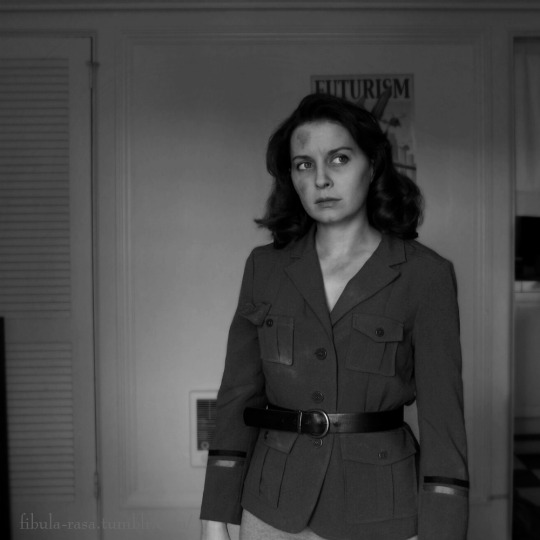
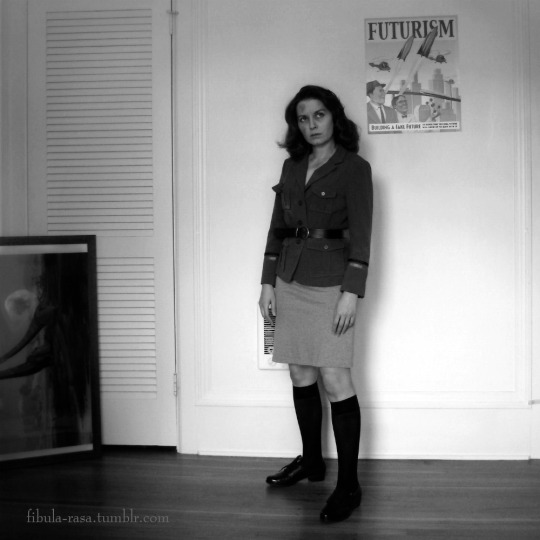
If you can believe it, this is my very first time cosplaying The Twilight Zone! (Though I did play Rod Serling in a set of sketches in high school. I was as weird as a teenager as I am an adult, okay?) If you didn’t already know, I run another blog called Twilight Zone in Close-ups, examining the powerful use of close-up shots on the show by testing out how much of each episode’s story can be communicated solely by its close-up shots.
☕ Buy me a coffee! ☕
#1960s#1961#elizabeth montgomery#the twilight zone#Twilight Zone#rod serling#classic television#television#closet cosplay#cosplay#television history#OTD#science fiction#speculative fiction#horror#1960s tv#tv
211 notes
·
View notes
Text
Everything I wanted
Chapter 1: Pretty Stranger...
Goo wakes up in an alley right after his fight with Gun at the school, only to find out he's in an entirely different country. Then he meets Gun. Goo's not the smartest person to ever walk the earth but he knew for a fact, Gun shouldn't be this short, or young. Gun, on the other hand, becomes captivated by a pretty foreigner with unparalleled strength. Or: Goo gets sent back in time to Gun's childhood and tries to figure out what's going on. The language barrier doesn't help.
Content: Angst, Time Travel, Touch-Starved Gun Park, Hurt/Comfort, Blood and Injury, Alternate Universe, Fix-It, Fluff,
I just wanna say that this is NOT my story, this story was originally posted on ao3 by a user called SammyLve. I do not intend to shame the maker of this story in any way; I'm simply just reuploading it so it can potentially get to a bigger audience.
But without farther ado, enjoy the story.




Goo’s first thought was that he died and went to heaven.
But then he realized he would’ve gone to hell.
Sadly it was none of those. He woke up lying on his side, staring at a brick wall.
He was confused, the last thing he remembered was stabbing himself. He expected a hospital maybe, so what the hell was this?
He let out a groan and pushed himself into a sitting position with a hiss.
Pain shot his stomach and it didn’t take him long to find out why.
His sword was still stuck in his lower abdomen, blood still dripping slowly and seeping into his shirt.
What the hell was this? Did someone try to dump his body? He wasn’t dead. Where the hell was he?
He was still wearing the same clothes.
Goo glanced around, he was dropped in an alley and could see the street in front of him.
None of this made any sense.
He was in the city. But if someone dropped him here there was no trail of blood from him to the alley entrance. There was somewhere he had been lying though. He couldn’t have been there for very long.
Thankfully the sword still being embedded in his stomach was slowing the flow of blood but now he needed a hospital.
He gritted his teeth while he got to his feet, his arm still hurt, and the tip of his sword was still stuck in his arm. Maybe a few fractured ribs.
Luckily, pushing through pain was a skill of his. Goo had killer endurance and could take one hell of a beating.
He blinked once he got out to the open street and froze. Wait. This didn’t really look like Korea.
He patted his pockets for the phone that wasn’t there. He frowned in irritation.
He walked up to one lady and she looked stunned.
“Hey, where’s the closest hospital?” He asked her and she backed away, shaking her head. He didn’t look that scary did he?
She babbled something in a language he didn’t understand. That only added to Goo’s confusion.
Yeah, this definitely wasn’t Korea. Well shit. What was he supposed to do now?
He didn’t even know which country he was in. Maybe he really was dead and this was hell.
That made the most sense. He sighed softly and waved her off before continuing down the street. He ignored the weird looks and just focused on putting one foot in front of the other.
He really liked these clothes, but now they were ruined. Oddly enough he didn’t feel worried about bleeding out. He felt a little numb, he wasn’t sure why. Maybe shock? The sounds of everything felt blurred as he stared at his feet.
He walked, and glanced around, looking for anything. Maybe a taxi or something, a giant sign labeled “Go here if you’ve been stabbed!” but luck didn’t seem to like him.
Goo walked past yet another street when something flew past him.
No. Not something. Someone.
Goo froze as the guy crashed to the ground he took a breath and the sounds all zeroed back in.
Talk about zoning out. It was loud.
It just looked like a stupid gang fight. Guess they happened everywhere.
There were shouts of anger and pain in the air as a group of men- boys- hard to tell, seemed to all swarming something trapped at the end of the alley.
Maybe not trapped because from the sounds it seemed like someone was winning.
Goo’s eyes narrowed curiously trying to see through the crowd. Should he be wasting precious time on something so trivial? Probably not. He felt a little lightheaded, he’d blame it on that.
It wasn’t till he caught a glimpse of a tuft of black hair that he froze. Was he hallucinating? He knew that haircut.
Goo straightened up despite the pain that flared in his stomach until he caught a flash of those black eyes.
Was that Gun??
Why was he so small? He got rid of that dorky haircut months ago!
Trying to peer over the crowd wasn’t working he hissed in annoyance. Fuck the hospital, what the hell was happening??
Goo felt someone grab his arm, some thud spouting something as he felt himself get pushed back.
Goo glowered and punched that man straight in the nose. He screamed and reeled back, gaining the attention of a few others. He didn’t have time for this, who was that kid?
Probably wasn’t his smartest plan but if that was Gun, he had a few words to say to that bastard. He grabbed anyone he could reach and threw them backward.
He elbowed someone in the nose and slammed his foot into someone’s knee. Whatever he had to do to get them out of his way.
The closer he got, Gun seemed to take notice of him.
Gun? Not Gun?
He was smaller, much smaller, like short-short. At Goo’s chest short. He saw those cold reverse eyes make contact with his own for a split second, a flash of confusion flicking through them before they darted away.
Goo winced as someone bumped into the blade still impaling him and he whirled around with a snarl, knocking someone’s teeth out.
Their numbers thinned until Goo was halfway through the crowd before he heard a shout.
Oh fuckkkk they had backup. The little guy was still fighting off the last dozen.
There were a lot of them. This was getting tedious. He didn’t have time for this.
Goo stared at them, then down at the blade sticking out of his stomach, then at the little Gun copy.
He was thinking about this too hard.
Good thing he wasn’t known for making smart decisions.
Goo wrapped his hands around the blade's hilt and pulled it out in one smooth motion.
He swung it at the approaching men.
He let out an even breath. He had full confidence in blades. Every swing cut down another line of men.
The throbbing pain in his gut faded until all he could hear was the sound of metal tearing through cloth and flesh.
He couldn’t hear them and didn’t seem fazed when their blood splattered his clothing and skin.
He didn’t stop till he got to where he started back in the street and everything came back into focus. Those who were smart ran.
Goo turned to look back at the boy staring at him with wide eyes. He wasn’t hallucinating. It really was Gun.
Goo took one step towards him, then another until he stood in front of him.
Gun stared up at him with a stunned expression. What was that look for?
Goo stabbed his sword into the ground and reached out.
And then he pinched Gun’s cheeks. Oh my god, this kid still had baby fat.
This was actually kind of cute.
His eyes narrowed as he pulled at Gun's cheeks. Yeah, those eyes were real. Did that stupid idiot have some sort of love child Goo didn’t know about?
Goo leaned down, watching those black eyes flicker around Goo’s features, studying to see if the blonde was a threat or not.
“Gun…” Goo murmured, making the boy jolt, his lips slightly parted in surprise.
He let go of his cheeks and pushed a hand through Mini Gun’s hair, his revolting, always perfect hair.
“Jonggun.” Stupid stupid bastard. He was hot when he was an adult and such a cute kid. What the hell kind of logic was that? It wasn’t fair.
He was young too. Shouldn’t he be in school?
The world around him started to blur until Gun was the only thing he could see.
He could see Gun’s mouth moving but Goo could hear anything.
He was still leaning, no, he was falling.
Goo’s legs gave out and his cheek hit the boy's shoulder.
He felt arms wrap around him, probably the only reason he didn’t hit the ground.
There was a muffled sound in his ear as Goo’s vision faded to black.
So much for a hospital.
~~~
Gun wasn’t prepared for this situation.
He was prepared for the fight. Not for the aid.
He didn’t even need it. He was doing just fine on his own.
Then he saw a face that stuck out in the crowd and some of the attention from Gun to the man.
The people he was fighting had rough faces and black hair, their faces twisted ugly in anger, fear, and desperation.
The stranger had a pretty face, with blonde hair, and a look of steely determination.
Gun didn’t think too much about it. He would fight the man when the time came. What else could he want other than to fight?
At first, he thought the blonde man could be the leader of the group, but no, the man was fighting along with him. Why? He had no clue. He didn’t really care.
Gun spared a glance at the alley entrance when someone shouted “YAMAZAKI”.
Gun released his grip on an unconscious man and let him crumple to the floor. Gun was surprised to see the man with yellow hair had really cut down their numbers.
He got a good look at the man.
Tall. Not fully blonde. The sides and under part of his hair were black. Bloodstained clothes and… a sword… sticking out of him?
He didn’t get enough time to contemplate that.
He himself had only a dozen or so left around him.
It didn’t take a lot of time until that number was zero before he spun around for his next opponent.
He stopped dead in his tracks, eyes wide as he absorbed the scene in front of him.
A broad back faced him, holding the same katana that had been buried in his stomach.
The tip of the sword was gone but that made it no less deadly.
Gun had seen his uncle handle a sword, but this was an entirely different level.
It was captivating.
Each slash made waves drop to the ground. Blood arced in the air but the man seemed unfazed.
Each movement was calculated. With each footstep, the tensing of muscles beneath his clothes, each twist of the man’s wrist, even the man’s breathing, Gun could see the faint rising of steam from his lips.
It was stunning. It was perfect. It was mastery.
He could feel his heart rate speed up. He was torn. He wanted to fight and he wanted to learn. He wanted to completely destroy the source of that perfection and make it his own.
Gun watched as the alley was finally emptied and the stranger turned to him before approaching him.
His face was pretty, no that didn’t do the stranger justice. His face was clear of imperfections, with sharp brown eyes, almond shaped, the sun reflected off blonde hair making it look golden, a narrow jawline, perfect nose and lips, even the messy hair that had strands hanging in front of his face didn’t do anything to ruin his appearance.
Gun didn’t even realize the man’s hands were so close to his face until he felt his cheeks being pinched.
He flinched a little but it didn’t hurt. Even when they were tugged, his face remained passive even as he felt a hand ruin the gelled hair he had worked so hard on. Surprisingly he wasn’t upset.
“Gun…” The stranger murmured and he flinched. This man knew him? Why was his accent so weird?
The man’s vision seemed dazed and he looked pale.
“Jonggun.”
Gun frowned, that wasn’t him. He didn’t have “Jong” in his name. Did the pretty stranger think he was someone else?
“You.. who are you?” Gun asked the man. He got no response.
The man leaned forward, and forward until their heads were almost touching.
Then the man fell past him.
Gun reflexively wrapped his arms around the stranger and braced himself from the sudden weight that dropped on him.
“Hey- Hey!” Gun snapped after the shock wore off. What happened? Gun gave the man a shake and got no response.
Gun felt something slick and he lifted his hand from the man’s back, it was stained with blood.
He was hurt? Who in the world could hurt this man? He shifted him to one arm and lifted his shirt. It was sticky and clinging to his skin.
A stab wound, and he was bleeding a lot. Not as much as he should be but who knows how long he’s been hurt.
Gun recalled the blade being stuck in the man’s stomach, then it wasn’t. Did the stranger take it out just to fight?
Why did he fight when he was hurt? Gun thought it was because the stranger wanted to fight him, but in the end, the man just pinched his cheeks and messed up his hair. It didn’t make sense. It confused him.
He shouldn’t care. But for once he was unsure, he didn’t think the stranger was an enemy.
Why did the man help him? Who was he? Where did he learn to fight like that? Who could have inflicted a wound on a man like that?
Those questions ran rampant in his mind. It wasn’t a want. Gun needed to know.
Gum shifted the man into his back, throwing muscled arms over his own shoulders. He wrapped his arms under the man’s thighs and pulled them up until he could grab the man’s dangling wrists.
Gun gritted his teeth as something nicked his hand.
Glancing down, he located the tip of the man’s sword, driven into his own arm. Gun grabbed his hand instead of his wrist and he took off running.
Every time Gun rounded a corner or leapted over something too harshly, he’d hear a soft groan in his ear.
It was a relief, at least the stranger was alive.
He made it back home in record time. He knew he caused a ruckus, he didn’t care. The guards who stood at the door seemed surprised to see their young master running at them with a person on his back.
He ignored them and burst through the doors.
“GET ME A DOCTOR.” He shouted at the top of his lungs. His call turned the heads of servants and everyone within earshot.
The quiet peace was disrupted as servants swept them inside and to an empty room.
“Save him,” Gun said coldly to hide the subtle desperation in his tone. The stranger was pulled from his back. The stranger's face was pale and sweaty, brows knitted together from pain.
People surrounded him, cloth was being pressed onto the wounds. Gun backed out of the room and everything became a blur. The doctor showed up not long after. People moved in and out of the room.
Gun stared down at his hands, they were still coated with blood, most of it had dried.
Gun got shaken from his daze when large hands covered his shoulders and suddenly Shintaro was in front of him.
“Gun,” He said, his soulless eyes staring into him. Gun blinked once, then twice.
“What did you say?” Gun asked him.
“What happened? Who is that man?” Shintaro asked again, glancing at the room people were still moving out of.
“I don’t know what happened to him, I was out managing all the gangs in the area, I was doing fine, then he came out of nowhere. He aided me. He didn’t attack me. He had a katana in his stomach.” Gun explained, forcing his tone to keep calm. Shintaro frowned and released his shoulders.
“I didn’t want to take him to a hospital, our estate was closer, and I thought bringing a man who was half-dead would cause us more trouble. Having him die would damage our reputation.” Gun continued, the last thing he wanted was for his uncle to misunderstand something. Gun looked up at him.
“Uncle, he was strong. I think he’s one of the strongest people I’ve ever seen. He used a broken katana, he cut down people like they were butter. I’ve yet to see anything like it. His movements were perfect Uncle.” Shintaro’s eyes widened slightly at Gun’s words and he stared at the room. Gun knew his expression was borderline hungry, Shintaro could see that.
“Alright, I’ll see if I can find anything on him, did he say anything to you?”
“He said my name and then called me ‘Jonggun’ as well. He spoke with a weird accent… he doesn’t look Japanese.” Gun said, glancing back toward the room.
Shintaro was silent for a couple of seconds, contemplating.
They got interrupted by the doctor coming out. Gun watched as he slightly cringed with both uncle and nephew's intense gazes bored into him.
“The young man is stable. He’s fortunate that nothing vital was punctured so there was minor damage to his internals. His arm is broken, but it seems it was set already. There are fractures along his ribs and shoulder blades. The most concerning thing is the blood loss, but that's been taken care of and he’ll get better within the week.”
Gun felt a wave of relief wash over him, that was more comforting than it should have been. Shintaro nodded and told the doctor to keep watch over the stranger before he turned to Gun.
“Go clean the blood off yourself, I’ll make sure someone stays with hi-”
“I want to do it, I’ll stay with him.” Gun interrupted. Shintaro’s head snapped towards him, Gun didn’t interrupt, but he needed to be there when the man woke up.
“Fine, he’s your responsibility. It's only right since you brought him. Don’t slack off on your other duties. See him and notify me when he wakes.” Shintaro stated and Gun nodded in understanding.
“Yes Uncle.”
Shintaro nodded his head and walked away.
Gun watched him leave before he entered the room.
The stranger had been set up with a white futon and pillow, he looked rather snug. His face was erased from any pain, looking peaceful. His skill was still much too pale.
Gun closed the door behind him and crouched next to the man, observing him.
He was prettier without the blood. He’d never seen someone with bleached hair before. Gun reached out and poked his cheek, firm, well taken care of.
Odd.
This was not the complexion of someone with that level of fighting skills.
Gun settled down next to the man.
He had no problem spending as much time here as needed.
~~~
The main room was filled with bustle. Why? He wasn’t sure, but it was annoying and disturbing his quiet.
Usually, when this happened he tuned out the officials. They could run everything through Shintaro. He guessed for the sake of face.
In one ear, out the other.
He had his back facing the rest of the room, a show of his indifference.
“Has everything been in check?”
“No disturbances in my sector.”
“What about that disturbance in the estate earlier today?” He cracked an eye open.
A disturbance? Here?
“Oh that’s right, I’ll… tell you later. We’ve got other business to talk abo-“
“What disturbance?” His voice rang out and the entire room fell silent. He wasn’t curious, more wanting to know why someone on his council wasn’t talking about this to his face.
Several eyes on him. Suffocating. Tiring.
A blunt voice spoke up, respectful with a tone that lacked fear.
“Gun Park-“ The man froze, frowning. “-brought home a strange foreigner with injuries. Barged right through the front door carrying him. Vice President Shintaro left the stranger in your child’s care while he tries to find out who the man is.”
He’d never heard that name before, nor was he aware of any children.
The man finally moved his head to look behind him, one piercing green eye scanning the room.
“Who is Gun Park?”
8 notes
·
View notes
Text
Been a while since we did this: It’s midnight and I’m thinking about six of crows, so let’s chat. I’m currently thinking about the experiences of Wylan and Inej echoing each other on opposite ends of the spectrum of cruelty created by the environment in Ketterdam, because ultimately it’s a system that favours no-one but the men who created it. Even though Inej is a foreign immigrant brought to the country against her will and Wylan was born to one of the richest families in the country, they both suffer greatly at its hands - arguably even in similar ways.
*Spoilers ahead!!!!*
Ok so this particular thought occurred to me a little while ago, and it was first sparked by the conversation Van Eck has with Inej at the beginning of Crooked Kingdom when holding her captive. He tells her he is not “a brute” but has simply “employed the methods you are most accustomed to - threats, violence” and her immediate response is “He sounded like Tante Heleen”. She goes on to remember Heleen’s words saying “Why do you make me do these things? You bring these punishments on yourself, girl”. So of course there’s this immediate link between them, and I would argue that the parallels are perpetuated throughout the novel as well. Quickly want to add as well that it’s really interesting to see Tante Heleen call her “girl”, because although this denies Inej identity and aligns greatly with the way she sobs at hearing her own name said aloud for the first time in a year when she meets Kaz, it doesn’t come across as immediately dehumanising in the way that other epithets used against her, like “little Lynx”, do. But interestingly enough, I actually think that it still is a dehumanising word when it comes from Heleen - because she does not see “her girls” as human. First of all, whenever the children at the Menagerie are referred to as “girls” it’s always in an entirely possessive manner - “your girl will he returned to you” “where is my girl?” “That is not my girl” (these are literally all from one scene, and there are way more throughout the books) - but the idea is only intensified by Inej’s own sentence: “not really people, not even really girls.”. As if “girls” and “people” are two separate entities. As if “girls” are not human. This is the language and the attitude that she was surrounded by at the Menagerie and is still surrounded by in the city, and what was forced upon her throughout her experiences in the country. But you know what else might be a genuinely horrifying little detail of this????? Inej may have actually taught herself that the words “people” and “girls” are not synonymous. Because when Inej was brought to Kerch she wasn’t fluent in the language, she spoke some of it and quickly learnt the rest through circumstance, so if this was the way she heard Kerch people use the word “girl” this is how she would internalise the definition of it. I hope this makes sense I’m not sure if I’m relating my thoughts very clearly, it’s kind of like how Matthias was forced to learn Kerch because he was in a Kerch prison so he doesn’t know words that would easily come to him in Fjerdan, like the snow goggles, but instead of simply having gaps Inej has actually learnt a false grammar system that defines “girl” as a dehumanising term because it means someone who is less than or someone who is property. Anyway, that was quite a tangent so let’s keep going.
I talked quite a lot about Wylan’s experience with abuse in my post about the similarities between him and Kaz so I won’t go into too much detail here (if you want to read that though it’s on my page, it’s called Kaz and Wylan’s Potential to Become Each Other, I can tag anyone who’d like to be tagged) but I want to mention the way Van Eck has conditioned his son to blame himself for everything he’s been through, rather than his father. Wylan actively blames himself, even after he discovers what his father did to Marya he says to Jesper “you don’t understand, it’s my fault” because he believes that Van Eck needed a convenient way of getting rid of her so he could remarry and have a child that he didn’t view as “defective”.
I want to talk about Inej during the bathroom scene in Crooked Kingdom, specifically focusing on the fact that this is really the moment she is most open about her trauma and reveals herself to be at her most vulnerable. Now I could talk for DAYS about the way she expresses herself in this scene in comparison to Kaz and why their vulnerabilities differ in different moments, but I’m trying to stay on track so maybe I’ll talk about that another time, the focus here is that in this moment when she is her most open with another character about what she went through she tells Kaz that “Tante Heleen wasn’t always cruel” and explains emotional abuse and manipulation that Heleen layered with her physical and financial abuse. It so importantly echoes Van Eck’s abuse of Wylan, because ultimately he was always an emotionally abusive and manipulative person. Discovering that Wylan couldn’t read at age 8 didn’t magically switch him from a loving husband and father to the monster we see in the duology, and it is implied that he was abusing Marya in some form prior to sending her away. But Wylan clings to the things that his father did that seem loving, at least on the surface, and blames himself for any problems in his parents marriage - “they argued a lot, sometimes about me. But I remember them laughing a lot too”. (The quote is along those lines sorry I don’t have my book on me right now). This quote always intrigued me because not only does Wylan label himself as the common denominator in any issues they had, he also quickly jumps in to add defence as if their relationship is never supposed to be touched upon or examined too closely. Wylan also says “My father trusts himself first, Alys only so far”, which is really interesting to me because it clearly implies that there is a limit to anything positive Van Eck shares with his supposed loved ones. I don’t think there’s supposed to be any implication that Van Eck is abusing Alys right now, but if you disagree please let me know if be interested to hear it, but I do think that we’re supposed to be aware that he would begin to do so further down the line.
Ok I won’t lie to you guys I’ve kind of lost track of my point, so I’m gonna leave this here for now and if I decide to add anything later then I’ll reblog to continue. If anyone would like to add anything please do, and thanks for reading!
#grishaverse#leigh bardugo#six of crows#crooked kingdom#inej ghafa#nina zenik#kaz brekker#jesper fahey#wylan van eck#matthias helvar#kanej#helnik#wesper#soc jesper#soc#soc matthias#soc nina#soc inej#soc kaz#soc wylan#wylan and jesper#nina and matthias#kaz and inej
146 notes
·
View notes
Text
Thelreads, MHA 303, Replies Part 2
1) “Oh, good, so besides the walking apocalypse, the goth trying to kill Endeavor and his family, and a killer who can be anyone anywhere, we still have an army of extremists and seven nigh-unstoppable killing machines. Good, I thought things would be sorta easy from now on.”- Technically, there’s two walking apocalypses out there: TomurAFO and the original AFO in his crippled body. He’s weaker than his “perfected” self, sure, but the power he wields still can’t be underestimated: I’m pretty sure that they’d need Izuku himself to handle the sheer power he can unleash, which is enough to level a city by himself. Tomura, in comparison, could potentially wipe out entire chunks of the country, so it’s purely a matter of scale in ranking their threat level 2) “jesus fuycking christ
truly the fall of society while the rest of the world watches. things are gonna turn real ugly”- The damage done truly underscores how isolated the heroes of Japan are, in addition to how overwhelming the crisis is for those struggling to provide some semblance of stability. 3) “And again: that was intentional, both by AfO as well as the liberation front. The more death and destruction, the more people will be willing to put up with anything to see the end of it, which means that society is yours to grab if you have the means, and AfO and Redestro most certainly do.”- And yet, for all that it’s bad, the thing I was always remembering during these chapters was, “at least it isn’t as bad as it could have been”. Like, yeah, this is absolutely anarchy on the streets and everything’s getting worse by the day but, the heroes’ efforts weren’t in vain. They weakened Tomura, stopped and contained not only Machia, but also Re-Destro and most of the PLF’s members, on top of killing the High-Ends and leaving TomuAFO with only some of the League’s core members to head up his villain brigade, which is also part of the reason he turned to destroying the prisons in order to maintain the upper hand, in spite of their clear victories against the Villains. Had everything proceeded according to design, the heroes would have had no chance at turning the situation around, but even with total societal breakdown occurring all around them, the sacrifices and lives spent in evening the odds (somewhat) were not in vain. 4) “OH? OKAY THEN? SO THERE’S A CHANCE OF FOREIGN HEROES SHOWING UP TO HELP, I SEE
YOU KNOW WHO WOULD BE QUITE THE HELP NOW? CAPTAIN CELEBRITY AND THE SKYCRAWLER, BUT YOU KNOW, FUCK THAT I SUPPOSE, IT’S NOT LIKE EITHER OF THEM HAVE ANY ATTACHMENT TO JAPAN OR SOMETHING.(I’m ready to eat my hat if they actually show up, rest assured)”- I honestly imagined Koichi getting stuck with the opposite problem of current real-world America during this: being an immigrant unable to quickly leave America.
5) “Hawks, is there still doubts about it? I mean, they all literally were talking about and confirming the situation a few minutes before. Sure, things are different, Endeavor wants to make up for what he has done, but I don’t think there’s much space for the benefit of doubt in relation to the past.”- Well, Dabi is still an admitted Villain with a clear agenda with his revelations against the Todoroki, so there was always some room for doubting what he said, simply because it was him saying it and not Endeavour. But with Endeavour and the others confirming it – not to mention clarifying details that Dabi didn’t want to talk about or simply didn’t understand due to his warped worldview, Hawks feels better about putting his full support behind Endeavour once again.
6) “Oh wait, so Jeanist is the current number three? Well, considering everyone else died or run away, I suppose he would climb the ranks.”- The odds are, Izuku is going to become the World’s Greatest Hero by the end of this, simply because he’ll be the onlyhero left standing.
7) “I mean, he already had stepped away from the family when he realized the depth of his fuck up before, so I don’t think he had any hope of coming back Natsuo. Also he’s probably gonna die in the end anyway, so.”- I read Natuso’s reaction as “I’m willing to put aside my grudge with you and not be antagonistic anymore, but only until the point we’ve resolved this issue with Toya, then it’s back to ghosting you from my life, ok?” And even then, Enji’s somewhat grateful he gets that kind of support from his estranged kid at all.
8) “I already imagine that you guys will need to soften things up with the public, and that will probably mean having to lie about the past. I hate it, but considering the chaos outside, I can see why this would be necessary, throwing more fuel into the ever-expanding inferno going on would only make things worse”- On the other hand, lying, or more accurately, not talking about the family issues in public, is partly why Toya revealing the truth then was such a devastating blow, propping Endear upon a pedestal that only made it easier for him to topple it over by undermining the foundations of that support in the public’s eyes. Therefore, it may be better, if risky, to just bite the bullet and swallow the poison pill, no matter how bad or difficult it’s be to do so in this current climate of unease.
9) “You’re barking up the wrong tree there Hawks, you should ask Midoriya or All Might about it, Endeavor is as blind as you are on that matter.”- True, but he is, ironically, the first person to find out about its existence from somebody other than All Might, which makes him the one people turn too for answers when both Midoria and Yagi are otherwise distracted.
10) “Oh thank you manga, so he did say that, but it was because Midoriya said it. Geez for a moment there I was trying to recall if they had told endeavor about One for All and the previous holders.”- And now the biggest change to the status quo. Up till this point, Izuku’s been able to trained and prepare himself in relative obscurity as an up-and-coming hero student, but with AFO’s plans in motion and society in a breakdown around him, that moment has passed. Now, the moment for people to recognise Izuku as the next Superman of their world is fast approaching…
11) “His body is completely fucked up, have you seen the amount of broken bones he ended up with? He managed to broke his tongue, how will they put a cast on his tongue?”- His body is broken, and frankly, for such a caring and empathetic young boy, to see such damage being dealt to those he cares about, knowing on some level that it was because of him, his spirit’s probably not much better off.
12) “I fucking forgot that was Bakugo’s hero name oh my fucking GOD why”-Your brain attempted to protect you from the mental damage. Alas, it only left you open for a fresh round of pain when it was brought up again. That said, it’s a nice sign of Jeanist’s sincere respect for Bakugou and his character development that he sincerely uses the name, treating him as an actual hero and peer without any mockery of his naming sense. 13) “OH HOLY SHIT
THEY ARE SPEAKING ALRIGHT, BUT THE LIVING ALL MIGHT IS NOT INCLUDED ON THAT, THAT’S BETWEEN MIDORIYA AND THE SPECTRAL ALL MIGHT SO THAT MEANS NEXT CHAPTER THERE’S GONNA BE SOME FUCKING REVEAL THAT’S FOR SURE”- Time to see more of/about the past wielders, now Izuku’s connection has been strengthened by his training and recent strenuous efforts…
Art by Doodlelotl


@thelreads
4 notes
·
View notes
Text
He reserves the right to attack any nation that attacks Russia, and that includes the U.S. and NATO who are allowing their long-range missiles to be fired into Russian territory
Leo Hohmann
Nov 21, 2024
Russian President Putin gave a 7-minute speech today and explained that they used a novel system, a medium-range missile with a hypersonic payload in its strike in Ukraine. It was essentially a test that worked perfectly.
As part of what Putin called a “combat test,” the hypersonic missile, dubbed Hazel, successfully struck a military-industrial facility in the Ukrainian city of Dnipro, the Russian president added.
The strike was a response to Ukrainian attacks on military facilities located on internationally recognized Russian territory, the president stated. Kiev’s forces launched the strikes on Tuesday and Thursday, using US-made ATACMS and HIMARS systems as well as British-made Storm Shadow missiles, he said.
The Storm Shadow attacks led to at least one Russian death and multiple injuries, Putin said. He said it is becoming a global war.
You can watch Putin’s entire 7-minute speech here.
On Thursday, Russian officials also threatened to attack a new U.S. ballistic missile base in Poland with what a Kremlin spokeswoman called “advanced weapons.” The base just opened on November 13.
“Given the nature and level of threats posed by such Western military facilities, the missile defense base in Poland has long been added to the list of priority targets for potential destruction, which, if necessary, can be executed with a wide range of advanced weapons,” Russian Foreign Ministry spokeswoman Maria Zakharova said, according to Reuters on Thursday.
Moscow reserves the right to strike the military facilities of countries that allow their weapons to be used against Russian territory, President Vladimir Putin has said.
The head of state gave a public address on Thursday, promising a decisive response to any aggression.
10 notes
·
View notes
Text
As Russian artillery rained down on the Ukrainian city of Kherson last year, one girl found a surprising way of processing the horror that was taking place. She passed the time in a bomb shelter playing the stark, many would say depressing, video game This War of Mine.
There is a critical burden for every Ukrainian this winter. For her, it is trying to make sense of a terrible conflict. For Ukrainian President Volodymyr Zelenskyy, it is getting the weapons and international support to fight Russia and keep strategic momentum on his country’s side. For his soldiers, it is trying to keep morale up and stay warm in freezing temperatures. And for the almost 8 million Ukrainian refugees that the war has created, it is trying to rebuild lives in foreign countries.
A disproportionate number are doing so in Poland, which has registered more than 1.4 million of them for temporary protection, the largest number of any EU country, according to ReliefWeb.
The country’s particularly strong solidarity is replicated across Eastern Europe. Warsaw resident Konrad Adamczewski puts it down to proximity: “This was a war that broke out in a neighbouring country. You could immediately see people coming to Poland for shelter.”
The company he works for, 11 bit studios, made the bestselling This War of Mine. The unnamed Ukrainian girl in the basement got in contact at some point last year to thank them for the help the game gave her.
11 bit studios has been showing its solidarity since the beginning of the war in other ways, too. Within hours of Russia’s campaign, the company launched a fundraiser. For a week, all proceeds from sales of This War of Mine would be donated to the Ukrainian Red Cross. Some $850,000 was raised, far exceeding what the company had expected. “The impact was huge. We were very happy we could contribute, but it was also hugely sad that in 2022 the message of the game was once again so vivid,” Mr Adamczewski told me.
It was a remarkable achievement financially. But, as Mr Adamczewski went on to say, it is only when you look at the content of the game itself that you realise quite how apt the campaign was on deeper levels. “We developed this as a game about peace. Immediately we saw people commenting online that the scenes of innocent people suffering unfolding on the news looked like This War of Mine.”
The game is, after all, entirely about war, but barely about soldiers. Instead, civilians are the protagonists in an unnamed conflict, as they try to survive and not lose hope in the process. Winning, if it can even be called that, is not triumph in battle, but just to survive until the end of the siege.
The setting is loosely based of the siege of Sarajevo, one of the longest in modern history, in which non-combatants were often forced into otherwise immoral acts to survive, be it hoarding resources, theft or even violence. But if the game had been released in 2022, Mariupol, Bakhmut or Kherson could well have been the inspiration.
Now the game is helping children outside Ukraine as well. At the end of 2022, it was officially included in Poland’s curriculum. Teacher Ilona Starosta says she uses it in her classes because of its many perspectives. “Students wonder what it means to win a game like this. Does winning mean surviving? Does it make sense to survive at all costs?”
These questions are not delivered in abstract debates. Players might be in the shoes of Adam, who struggles to get medicine for his ill child as he tries to untangle his own mind from severe shell shock. Or they might be journalist Malik, who has to balance the need to broadcast life-saving information with not angering a censorious military.
For Mr Adamczewski, the potential for explaining these dilemmas makes gaming a uniquely powerful tool for learning: “When children study literature, there is often a question of what the author had in mind. But in games, you become the author.”
The depth of the game has caught global attention. In the UK, London’s Imperial War Museum features it as an installation in its War Games exhibition, which opened in September. Curators placed it next to artefacts that captives made during the Second World War to create a sense of normality during extreme hardship; they include a teapot, given to an English prisoner of war by a Polish comrade, and improvised cigarettes. In the US, the game is featured in New York’s Museum of Modern Art’s exhibition Video Games and Other Interactive Design, which also opened in September.
However much renewed attention the game is getting globally, it remains a success firmly rooted in Poland. Like many other places in Eastern Europe, the country has a remarkably creative independent gaming sector.
As a developer, Mr Adamczewski says that the arrival of personal computers in the 1980s was a radical opportunity to learn more about life outside the communist bloc. More simply, people also wanted to use them to play games. With no access to ones developed in the West, people started developing their own. This wider wave of tech curiosity and the chance to start afresh after the fall of the Soviet Union are reasons that Eastern Europe has much better internet connectivity than richer western European countries.
But more than just a leading economic asset, the region’s gaming sector is becoming a cultural one, too. In the case of This War of Mine, to remind people that war has a terrible, complex impact on civilians. It is far too soon to say if a video game will ever reach the renown of All Quiet on the Western Front or Dulce et Decorum Est, classics that will explain history's worst moments for generations. But if one ever does, it could well come from Eastern Europe.
19 notes
·
View notes
Text
Recently Viewed: The Little Girl of Hanoi

The Little Girl if Hanoi is a work of North Vietnamese propaganda.
Which isn’t a judgment of the film’s quality, but rather a neutral statement of fact. While the term has developed a negative connotation in recent years, its true function is merely to describe a story’s content: if it advocates a political message (particularly one endorsed and supported by the government in question), then it is, by definition, propaganda. Whether said message is “good” or “bad” is for the viewer to decide.

Given this context, how else am I supposed to classify a movie that depicts Ho Chi Minh (via repurposed archival footage) as a benevolent, grandfatherly, almost deific figure, generously distributing cigarettes to the brave, exhausted troops defending the capital? At one point, an old nanny comforts a sobbing infant by promising to protect him from Nixon, likening the president of the United States to a sinister bogeyman lurking in the shadows (a not-entirely-inaccurate assessment, to be fair). In an especially heart-wrenching sequence, the young protagonist’s neighbors not only escort her to the front of the local food line, but also ensure that she receives the maximum ration of rice for her household despite the apparent loss of the rest of her family—an act of solidarity that serves as the thematic anthesis of Isao Takahata’s unflinchingly pessimistic Grave of the Fireflies (which, in case you were unaware, is about a pair of abandoned Japanese orphans slowly starving to death at the height of WWII).
Obviously, the tone is unabashedly melodramatic, painting in broad strokes of pathos and sentimentalism. The characters’ joy in the prewar scenes is so palpable that it borders on comedic, as though their grins are permanently chiseled onto their faces; they likewise communicate their grief by gazing tearfully into the middle distance—a technique blatantly borrowed from Hollywood. This relatively exaggerated style of performance clashes with the dissonantly naturalistic setting; much of the narrative unfolds amidst the actual rubble of the titular city, which had not yet fully recovered from the still recent bombing raids. Tran The Dan’s cinematography omits no detail of the destruction: through his lens, the ruins utterly dwarf their thoroughly traumatized inhabitants, reducing the human subjects to insignificant specks that are barely discernible within the cluttered frame; his camera, meanwhile, swoops and soars like a disembodied phantom, mournfully observing the devastation from the world beyond.
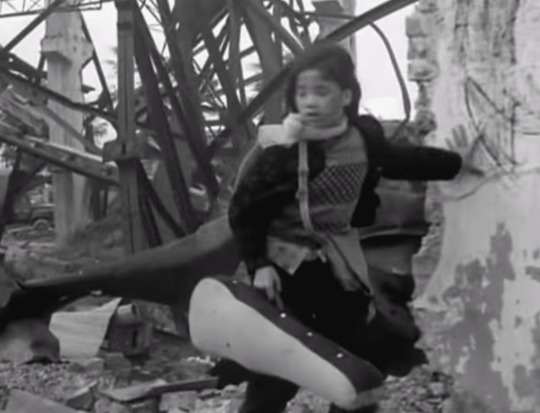
A cynic might dismissively describe this blunt presentation of such potentially inflammatory material as “emotionally manipulative.” I must concede the argument to a certain extent: the film is unapologetically transparent in its intent to evoke sympathy and rouse the country’s fighting spirit. Nevertheless, I vehemently disagree with the notion that this is some kind of damning criticism—opposing imperialism, colonialism, and expansionism should, after all, be considered an inherently noble goal. Ultimately, The Little Girl of Hanoi is a hauntingly authentic portrayal of its creators’ lived experiences, making it an essential cultural document; for any jingoistic Americans ignorant of how our nation’s foreign policies are perceived by the wider global community, this ought to be required viewing.
2 notes
·
View notes
Text
Crack Dragalia Theory:
...Did Midgardsormr kill the royal family's mom?
Okay, hear me out in this relatively unevidenced argument.
Here's what we know of the Queen's cause of death:

So she left to a village that had severe storms and got killed in a tornado, caused by a dragon. Ok.
Here's Mids' story.

Now, you might be saying, Mids surely isn't the only one whose presence is tied to storms. And for that, you'd be entirely correct. Dragons like Zephyr and Pazuzu are both also noted/claim to be able to summon storms in their presence.
However, Pazuzu, who would be the best counterargument, doesn't 'just' bring storms - he poisons things in his presence, poisons water, spawns miasma. He's the embodiment of calamity- a simple tornado wouldn't be the only thing he kicks up, even if he could potentially have been drawn to the previous disaster unfolding.
Most other wind dragons wouldn't likely be in Alberia. Several are on top of (or inside of) mountains, or otherwise just not noted to having a proclivity (or power) to starting tornadoes or other wind events. Others are wanderers free as the wind. Others have other environments they prefer, or in another country to begin with.
I'd also like to bring up geography, everyone's favorite subject.
Here's South Grastea:

Here's some relevant geography marked that I made a bit ago:
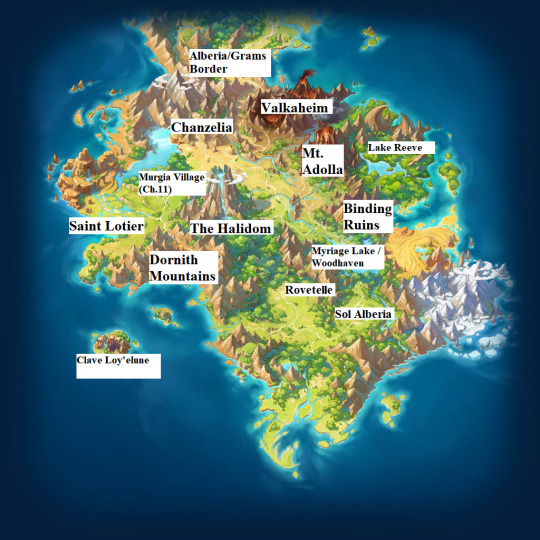
Here we can see that there is both a settlement close to Sol Alberia (the capital, mind you)... and one that's directly next to Mids' territory.
Mids 'marks his territory' with gales. He might have unintentionally kicked up a tornado near his forest, the boundary of his territory, and it caught Rovetelle, killing the Queen, who had simply stepped out of the capital's safety to a nearby village (see how close they are), thinking it relatively safe for a good PR move or something. Rovetelle is also called the 'City of Trees' in a weapon description, so it seems quite close to the forest.
Now, yes, there may well be undescribed dragons that could have done it, but if you are willing to entertain Rovetelle as a potential location for the demise of the Queen, I would counter that a dragon as powerful as Mids likely discourages other dragons from even daring to encroach on his territory. He's the primal embodiment of wind and revered among dragonkind, he's not just another to squabble over territory with.
In less of a logical sense, it also would add some thematic oomph to Leo's grandstand at ch.12. That battle takes place, in, you guessed it...

Rovetelle forest. And since you can see that both Chanzelia and Valkaheim both are to the north of the Halidom, they both for some reason decided to circle all the way to the southern forest to approach instead of attacking from its eastern side.
You could argue that they are to the south because Euden and co were apparently going to be making moves on the capital and that they were acting in defense, but neither Chelle nor Leo are exactly jumping for loyalty/joy in defense of Morsayati.
Leonidas is also very impulsive in this battle.

He starts the chapter off stewing about his mother, her death, and then he and Chelle decide to make a stand in the forest, where he's immediately throwing out the big guns and otherwise much more intense about crushing his opposition.
Is it so foreign to consider he might be feeling even more testy than he is usually if he knows he's fighting in the area where the Queen died, fighting against his brother who has maybe pacted with the dragon that did it, however unintentionally?
It being Mids also would reduce the likelihood that enough people would've been willing to get angry and go after the dragon for vengeance - again, he's the Windwyrm. Deeply revered on top of all the normal worship dragons get. And not easily found on top of it.
Of course, then it adds in the extra little twist of Euden and Mids' relationship as first pactwyrm. To the immediate reflexive question of 'why wouldn't Euden know that'? though, I would suggest that maybe it was just another thing Aurelius kept in the dark from him. It's sufficient that he knows his mom died in a storm in a village doing good deeds, he doesn't need to know that Aurelius is sending him out to try to pact with the dragon that potentially did it. It's exactly the kind of truth that Aurelius seems most inclined to lie for, to try to save his children some grief and complicate their lives, just as he did surrounding Euden's... 'younger years'.
As a final offhand note, I might throw out Sophie's story.
We find out there that Euden's mom might be haunting him protectively. Ghosts are a real force in Dragalia, both malevolent and benevolent, and I do believe we see some correlation for 'their place of death' and 'weird necromancy stuff in general' between zombies and ghosts. In short: where people die, ghosts and zombies are more inclined to pop up.

Is it any wonder Ghost!Mom was able to 'find' Euden to start protecting Euden again, then, when he starts wandering around the very forest she died near/in? After all, why attach to him in particular instead of any other sibling or just Aurelius if she could roam free? It's because he was the first one to start wandering in the area - Notte and Zethia followed him after he tried to make them stay home!
I'll throw in the most crackish 'evidence' to this whole thing as a final note, too:

Maybe Mids picks up on Euden's mana weirdness here because he, as a dragon, is intimately familiar with what is roaming about his forest, as is shown, and at some point passively became aware of the Queen's spirit haunting the woods (dragons are very spiritual creatures in Dragalia and sensitive to mana/this kind of stuff), and is thus attuned enough to the specific feeling to go 'hey, wait a minute, that feels familiar but from where-...' when said ~vibration~ starts coming from Euden?
So... yeah. Hopefully my argument here is at least vaguely convincing to say that there is a good chance that Midgardsormr unintentionally killed Queen Mom!
#dragalia lost#dragalia#dragalia analysis#I'll be honest I started out with like one piece of evidence...and then just kept remembering more and more#That really helped the argument click together!
6 notes
·
View notes
Text
“In a surprise televised address to the nation, Putin said on Thursday that Russia had fired a hypersonic ballistic missile called Oreshnik (Hazel) at a defence plant in Dnipro, a city in central Ukraine. He said the missile was designed to carry nuclear weapons, but that it had been armed with a conventional warhead.
Putin portrayed the attack on Dnipro as a response to the use by Ukraine this week of American Atacms and British Storm Shadow missiles on targets in Russia's Bryansk and Kursk regions. "From this moment on ... the regional conflict in Ukraine provoked by the West acquired elements of a global nature," he said.
The Kremlin could order strikes on countries whose weapons are used by Ukraine in Russia, Putin added. Fears of a nuclear conflict have escalated to their highest since the end of the Cold War.
"We consider ourselves entitled to use our weapons against the military facilities of those countries that allow their weapons to be used against our facilities," he said. "In the event of an escalation of aggressive actions, we will respond just as decisively."
(…)
Putin had previously warned that the use by Ukraine of western missiles inside Russia would be equivalent to a declaration of war. Andrei Kelin, the Russian ambassador to Britain, said the use of Storm Shadows on Russian territory meant that Britain was "directly involved" in the conflict in Ukraine.
Putin added: "It is not Russia but the United States that has destroyed the international security system and by continuing to fight lin Ukrainel, clinging to its hegemony, is pushing the entire world towards a global conflict."
(…)
Analysts said the use of such missiles made little sense from a military point of view and that the attack was likely to have been an attempt to force the West to drop its support for Kyiv.
Nick Brown, director of the British defence analyst Janes, said: "This is really about sending an escalatory message or warning, an expensive and potentially dangerous way for Russia to rattle its sabre."
(…)
The Pentagon confirmed that Russia had notified the US before the missile launch through nuclear risk reduction channels. The White House also said it was "aware" of the launch.
"This was a new type of lethal capability that was deployed on the battlefield, so that was certainly of concern," Sabrina Singh, the deputy Pentagon press secretary, said. She noted that the experimental missile could carry either conventional or nuclear warheads.
(…)
Hardliners in Moscow have urged Putin to carry out a demonstrative nuclear strike to force the West into abandoning its support for Ukraine. Sergey Karaganov, chairman of Russia's influential Council on Foreign and Defence Policy, said last year that a nuclear attack on a European city would "sober up" Moscow's enemies.
Putin's warning came after a report claimed that the Russian leader had not been seen in public since November 7, when he congratulated Donald Trump on his return to the White House at a forum in Sochi.”
“NATO and Ukraine will hold emergency talks Tuesday after Russia attacked a central city with an experimental, hypersonic ballistic missile that escalated the nearly 33-month-old war.
The conflict is “entering a decisive phase,” Poland’s Prime Minister Donald Tusk said Friday, and “taking on very dramatic dimensions.”
Ukraine’s parliament canceled a session as security was tightened following Thursday’s Russian strike on a military facility in the city of Dnipro.
(…)
Ukrainian military officials said the missile that hit Dnipro had reached a speed of Mach 11 and carried six nonnuclear warheads each releasing six submunitions.
(…)
Separately in Kyiv, Czech Foreign Minister Jan Lipavský called Thursday’s missile strike an “escalatory step and an attempt of the Russian dictator to scare the population of Ukraine and to scare the population of Europe.”
At a news conference with Ukrainian Foreign Minister Andrii Sybiha, Lipavský also expressed his full support for delivering the necessary additional air defense systems to protect Ukrainian civilians from the “heinous attacks.”
He underlined that the Czech Republic will impose no limits on the use of its weapons and equipment given to Ukraine.”
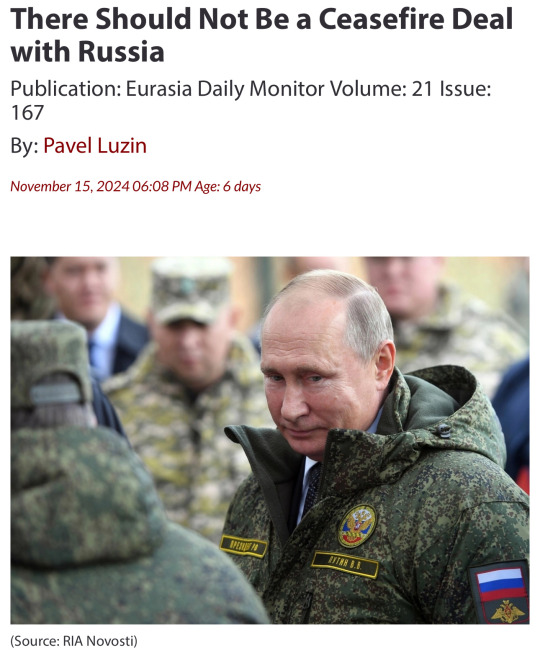
“Besides eliminating Ukraine’s statehood and culture, these purposes include undermining the United States’ global role and eliminating Trans-Atlantic unity. To accomplish these goals, Russia is developing an axis of totalitarian and authoritarian regimes. Most worryingly, it receives weapons from Iran and North Korea. In return, Russia aids North Korea and Iran in the development and deployment of satellites (see EDM, November 4). This assistance inevitably contributes to their missile and nuclear programs (South China Morning Post, July 9). The ability to operate a satellite in low Earth orbit allows for a warhead to be launched by an intermediate-range or intercontinental ballistic missile through an exoatmospheric trajectory. Russia’s partnership with these countries gives both Russia and the other powers the ability to continue developing their authoritarian regimes. Moreover, Russia’s “holy war” against the United States and the West became a significant tool for domestic consolidation of the authoritarian regime with dysfunctional institutions of power (see EDM, January 30, 2023, August 5).
The Russian army is in a precarious position in Ukraine. While it is still capable of capturing pieces of devastated Ukrainian territory, as long as Ukraine continues to receive weapons and other aid from allies, Moscow is unable to defeat Kyiv’s army and to make it surrender. Paradoxically, even as Russia’s ability to continue to advance arms manufacturing and sufficiently train its military worsens, the state of Russia’s abilities remains a long-term, dangerous, and unpredictable threat until defeat. Risks arise if Russia is granted a ceasefire, as it will allow for restoration and room for maneuver in other theaters where it can become a much more urgent threat to the West.
Despite its quantitative superiority, Russia can be defeated in Ukraine. Historically, superior powers were defeated by weaker opponents. Coalitions based on shared values and economic interests have consistently been stronger than superior powers or any axes of dictatorships. For example, the British Empire was defeated in 1783 after the American Revolutionary War. The German Empire was defeated in World War I in 1918, even though it controlled huge territories from Ukraine in the East to parts of Belgium and France in the West. There were just no compromises or breaks for the aggressors.
The same should hold true today. There cannot be a compromise. Russia needs the whole of Ukraine under its political, military, and economic control, and it needs a springboard for further actions against the United States and its European allies due to Russia betting everything on this war. It is not just a matter of historical chimeras, but a matter of political, economic, and even physical survival of the Russian political elite.
In turn, Ukraine is struggling not just for the liberation of territories, but also for the survival and elimination of the Russian threat. Perhaps the liberation of territories will be a sequence in Russia’s defeat. Ukraine can continue to constrain and slowly destroy Russian ground forces only if the United States, Europe, and other partners continue to grant assistance to the war effort.
(…)
International aid, together with necessary strikes against Russian military-industrial facilities, will hinder Russia’s ability to restore its conventional military power, dramatically limiting it in the long term (see EDM, October 24). While simplifying arms manufacturing could allow Russia to restore part of its military power, this is not a sustainable method. For example, it could produce armored commercial trucks made domestically using China-made components or arms imported from China, but Russia is limited in which countries it can import materials or weapons (Russian-chinese.com, May 14; Izvestiya, October 14). As Russia continues down this path, it could remain a threat to its neighbors for the short term, but it will not be a vital threat as its military-industrial complex continues to deteriorate.
Despite its military deterioration, Russian leadership still demonstrates a will to fight. It is harder to say the same about Russian society. Forty percent of Russians still approve of signing military contracts, against 42 percent who do not, and 17 percent who found it difficult to answer. Russian support for the war is still very high in Russian society (Levada.ru, November 6). However, as the Kremlin continues to take away incentives to fight and support its war, as they have just done for wounded soldiers, the will to continue the war will continue to slowly but irreversibly decline. This process needs time to occur, but the West should do everything it can to facilitate the degradation of the Russian army, military-industrial complex, and support for the war. If the West allows for a break at the current stage of the war, the Kremlin will gain room for maneuvering, recuperation, and the opportunity to convert the Russian people’s frustration with the war into the next round of support and aggression.”
2 notes
·
View notes
Text
ON THE THALASSIAN 'PRIESTHOOD'
(NAMELY: THOSE MAGISTERS WHICH HUMANS ASSUME TO BE PRIESTS, BUT WHICH ARE GENERALLY NOT)
Priests are most commonly utilized within Quel'thalas for their skills with mind-affecting magics. The city guardsmen often call upon them to soothe agitated crowds, disperse riots and other such violent gatherings peacefully rather than to permit harm done to any of our own kind or even our allies, and to sense the minds and intentions of those who would do Quel'thalas or its people harm, even if the intruding bodies are hidden from the watchful eyes of the guardians. (Source: [1] [2] Additionally, as another fun OOC note before we get started, Blood Elf priests are the only ones that start with a dagger in the entire game, not counting Allied Races that are obviously related to them such as Nightborne or Ren'dorei, who I admit I haven't checked on.)
Necessitating special delineation and discussion more than any other is perhaps the "priesthood" of the Sunfury Spire, as it was so named by the heavily theocratic Humans of Stormwind after their introduction to Silvermoon City some few years past and is even still so called abroad. To be brief, in the interests of education: though some magi study schools of magic and spellwork which may resemble--or even be genuinely originating from and/or identical to--the "holy" magics of other, foreign religions, these magi are not necessarily priests of those religions. The converse is also true. Most religious Sin'dorei are found among these ranks, and are in fact welcomed despite the generally secular nature of both Sin'dorei society and the Sunfury Spire, as their perspectives on and knowledge of these magics provide what would otherwise be missing or inaccurate information to the Spire and its archives.
Some mages study what humans and other magic-users think of as divine or divine-adjacent magic. A significant minority of these mages are also genuine practitioners of one religion or another, ie. being literal 'priests' in the wider Azerothian sense. The remaining majority are magi or Magisters, not priests, and simply specialize in the relevant magical field of study.
With that thusly established, in the Thalassian language as well as in terms of the organization of the Spire, those mages who do choose to specialize in these 'holy' schools of magic--particularly those who are explicitly not pursuing the rank of Magister/Magistrix but who instead study, labor, and otherwise contribute to the Spire without this total and explicit denial of the self in service of their country--are often given the title 'Priest' once they complete their education and join the ranks of their peers in labor. This title is nearly exclusively for male practitioners, with only few exceptions; female mages who pursue these arts are often given the title 'Matron'. Priests and Matrons are the relative equivalent of Magisters and Magistrixes, but with respect paid to their unique needs both in terms of education and potential personal beliefs, which might conflict with the oaths taken by Magi and thus explains their nearly complete non-existence within those ranks. Notable is the fact that the Matrons have historically always been at the head of the order, while priests tend to be mid- and high-level aides and state actors.
Priests and Matrons are also utilized more heavily by the Spire within Quel'thalas than their relative equals among the Magi, who are much more commonly either deployed without our great nation or else are sequestered in research facilities in its service. As priests' skillsets and magical knowledge were comparatively quite rare among the populace of Quel'thalas even before the Razing, and as they obviously so remain now in light of their added indispensability in both restraining the Naaru--and with great deference paid from this humble author to the Priests and Matrons whose knowledge and research was the only reason that His Most Radiant Highness, Prince Kael'thas, was able to make his own breakthrough in terms of the nature, control, and containment of these powerful creatures--their small but crucial order of mages forms the backbone of both Silvermoon's peacekeeping force. They are also healers alongside our more conventional military units, researchers aiding the Magi as well as even Horde druids and alchemists in everything from plagues and warfare to healing the Dead Scar, and can even be clandestine operatives abroad.
Not to be understated is the priests' philosophical, literary, and even spiritual contribution to our great society: far be it from even the Sun-King to judge what an individual believes or finds comfort in, so long as it does not lead them to act against the homeland that had loved them so unquestioningly and supported them so generously, and so some religious priests do indeed lead sermons for even the most niche of spiritualities within the Spire. Many of our greatest philosophers throughout history have been spiritual leaders, from ancient Sun-worshippers to the liberal-minded few who took up the Human worship of the Light. Affecting our society and vaunted by our learned even today is the aggregate collection of philosophical, moral, and societal literature written by the Elune-worshipping Highborne magi and poets of old, who had themselves the intentions of guiding their own people just as the Magisters do for us today.
It is also through the efforts of the priesthood that the Sin'dorei have found common ground with, and achieved diplomatic successes among, not only those traitorous thieves we once forged with our own Alliance--which they have now stolen from us, having judged that our secrets and knowledge and compassion and land were all not enough, in true human fashion--but perhaps even moreso among our new allies within the Horde.
Darkspear diplomats even begin disclose to us now the nature of their barbarian but fascinating and previously undocumented beliefs, and in turn arm us well against the Amani through our mutually shared disdain for those cannibalistic invaders whose society is apparently even beneath the Darkspears' own slightly more advanced one. All of this would never have been discovered had we not reached out the hand of friendship through spirituality. Forsaken cultists of Shadow and Sin'dorei students of its power find great community between one another, and the Lightslayers of the Undercity have found great boons in both our knowledge of holy magic, doctrine, and particularly Stormwind beliefs as well as our ability to wield the magic now denied to even they who had been most devout in life.
The Tauren find agreeable our botanists and Sun priests, and begin to consort with our botanists in hopes of teaching them their own fascinating belief system surrounding druidism. The Spire hopes strongly that in time we will master their artform so as to improve upon it as our own and thus might even heal our torn lands; this goal the Tauren diplomats have already expressed interest in sharing, again as a consequence of our priesthoods' willingness to embrace the foreign, strange, and even the nonsensically barbaric. Even the Orcish shamans find our harmony with our land and its spirits to be worthy of study and perhaps can even be led to emulation.
The Horde's cultures may be undeveloped by some reckonings, and though this author humbly recuses himself from further such commentary by virtue of having failed his freshman anthropology courses twice, one may find it more suitable to conclude with the reckoning of the priesthood itself:
"In undergoing this [generally speaking 'pre-societal' period of cultural development], the Horde at large is ripe for mutual education, societal cultivation and guidance as we might our own gardens, and in time may even be capable of establishing the long-term bonds and alliances which our people--Sin'dorei being generous, open to both teaching and learning, and generally communal by our basemost natures--so crave: ties of true friendship and even that of family, in that siblings are each vastly different but beloved by each other for it.
These ties, if properly built and maintained in the way of our forefathers rather than those of mortal hands, can not be so easily broken as was the shallow bond that had been forged and destroyed with equal haste by the fecklessly impatient thrashing of other mortals that had thought themselves the masters of their planet. This time, we will not quietly await their realization of their hubris, but instead shall... correct them."
- Matron Ael'thissa
2 notes
·
View notes
Text
Hufvudstadsbladet continues its coverage of the increasing risk of Finns being taken hostage as Moscow uses prisoners as leverage.
The paper spoke to two Finns who said they have continued working in Russia since the Kremlin's war in Ukraine began.
While those talking to the Swedish-language daily said they were being more careful than before in the country, security was always at the back of their minds, especially when crossing the border.
"I always weigh the risks of the trip against how important what I need to do in Russia is. I perceive the risks to be small enough that my work there outweighs them," one man said.
There are, however, far fewer foreigners on the streets of Russian cities now.
"Your instinct is to stay under the radar," another interviewee said.
Exiting a business after decades in the country is, however, easier said than done.
"There are probably people in Finland who think it's almost criminal to have anything to do with Russia. But what are you supposed to do if you have had your entire family, your business and your only source of income here?"
Egg recall
Readers are flocking to Taloussanomat's list of potentially salmonella-contaminated eggs.
Egg company Kieku has announced that salmonella has been detected on one of its farms, and TS has pictures of all 13 different cartons with eggs coming from the farm in question.
Kieku recommends that consumers either discard or return any eggs with the farm identification code 2FI220479 on the shell, TS reports.
According to the Finnish Poultry Association, there are more than 2,500 different known types of salmonella.
Darkening but warm nights
The end of August is turning out to be warmer than usual in both central and southern Europe — including in Finland, where forecasters say warm days are expected to continue into the early part of September.
Temperatures in Finland are higher than usual for this time of year, Helsingin Sanomat reports, noting that Thursday and Friday will be balmy.
Things will, however, turn soggy this weekend as forecasters anticipate showers.
2 notes
·
View notes
Text
AGDAM, AZERBAIJAN—In a clearing between overgrown grasses, Khalid Zulfugarov opens a stack of wooden crates, each filled with bright chunks of metal that glint in the winter sun. There are shells, anti-tank mines, and cluster bombs with tail fins. Nearby, next to a crater blown in the earth, a 20-liter water jug is filled with thousands of bullet casings, piled together like spare change, the collected relics of a conflict that has ravaged this land for 30 years.
Zulfugarov, the head of an Azerbaijani mine disposal team, is picking through his contaminated homeland, sifting through the soil with sniffer dogs and metal detectors to find each tiny, potentially deadly fragment. As he does so, his memories of Karabakh rush back.
“This is where I was born. I studied here; I fought with my friends,” he says.
His ancestral village is Nuzgar, which is located 50 miles south of Agdam, the area that he is currently clearing. It was once a bucolic settlement on the fertile lowlands of the southern Caucasus, mostly home to farmers who tended the rich, arable land. During Soviet times, it was part of the Nagorno-Karabakh oblast, home to ethnic Armenians and Azeris such as Zulfugarov, as well as the vineyards that produced the Soviet Union’s best-known cheap wine.
But when communism collapsed, so did the peace in Karabakh. Newly independent Armenia and Azerbaijan fought over the territory. Neighbors became enemies, and as Armenian paramilitaries gained control, Karabakh’s entire population of 700,000 Azeris fled.
For the next three decades, Nagorno-Karabakh was governed by an ethnic Armenian administration as the Republic of Artsakh, an unrecognized country. Its shrunken, monoethnic population lived up on the mountains at its heart. Down on the plains, the abandoned Azeri towns and villages were looted and closed off to the world, becoming a buffer zone between Artsakh and Azerbaijan. A de facto 185-mile border was carved into the landscape with berms, barbed wire, and land mines. What was once vineyards became a barren no-man’s land.
In 1993, Zulfugarov, then a 19-year-old Azerbaijani conscript, fled Karabakh to Azerbaijan proper. There, he worked in construction before joining the national demining agency. For the past three years, he has been clearing the land just miles away from his home village of Nuzgar, yet he is still unable to return.
In 2020, after 26 years of relatively frozen conflict, Karabakh’s war reignited. Azerbaijan had turned into a gas-rich autocracy, and grievances over its loss of Karabakh had become central to its national story. Baku wagered that the geopolitical timing was right, and over the first nine months of 2020, it pumped up its military arsenal with $123 million of Turkish-made defense and aviation equipment. On Sept. 27, Baku launched a surprise offensive and recaptured the lowlands. Three years later, it launched a second offensive and seized the main city, Stepanakert, too. Nearly all of the region’s entire ethnically Armenian population fled, just as the Azeris had three decades earlier.
On Jan. 1 of this year, the Republic of Artsakh officially ceased to exist. The land that was once Nagorno-Karabakh is now fully controlled by Azerbaijan.
War and occupation have stripped the landscape of life and color; the ruins of Azeri villages are now the same beige-grey as the scrubby undergrowth, the once-fertile soil riddled with metal from tanks, shells, and bullets. The pomegranate trees are among the few things that survived from the old times, bearing yearly fruit that hangs unpicked until it bursts blood-red.
The area remains closed to the public, but Foreign Policy was granted access by the Azerbaijani government. (We were not given permission to visit some areas we requested, and Stepanakert is currently closed to foreign media.) We spent five days in the region, being escorted through a huge reconstruction project unfolding behind a curtain of checkpoints: demining sites, new villages, roads and airports, and reforestation projects, all being readied for former residents to return.
The fighting in Karabakh is now over, and the Republic of Artsakh is no more. But a new conflict—this time, centered on the region’s landscape and the scars that war has inflicted on it—is now underway.
Since the beginning, nature has been both a victim to and a weapon of Karabakh’s conflict.
Nagorno-Karabakh is the water source for much of the southern Caucasus. Tributaries of the major Aras, Kura, and Tatar rivers run through the region’s mountains and down to the plains of Azerbaijan. The Soviet-built Sarsang reservoir—once the biggest in the region—fell under the control of Artsakh in 1993. In September 2013, Baku filed a case with the Council of Europe, complaining that Artsakh was misusing Sarsang and intentionally depriving 400,000 people in Azerbaijan’s border regions of water. Baku’s case succeeded: In January 2016, the council called for Armenian forces to withdraw from the area around Sarsang to allow international teams to assess and repair critical infrastructure.
When Karabakh’s hot war reignited in September 2020, the landscape quickly became a focus of misinformation. Huge forest fires broke out on the front lines in the far north and southwest of the territory and close to Stepanakert. Fires are common in conflict, but these blazes were immediately weaponized. Azeri social media accounts accused Armenians of torching the trees as they fled the advancing Azerbaijani army. Armenian accounts accused Azerbaijani forces of starting the fires with incendiary weapons to provide cover for their offensive.
“Nowhere else has environmental misinformation been used at this level. It’s just off the scale,” said Eoghan Darbyshire, a researcher at the U.K.-based Conflict and Environment Observatory. He analyzed open-source satellite imagery and climate data and found that while the fires were almost certainly related to the conflict, proving who had started them and how was far stickier than the absolutist social media posts suggested.
By November 2020, Azerbaijan had recaptured the Karabakh plains, and Artsakh conceded the loss. Stepanakert remained in Armenian hands, while the rest of the territory was left with Azerbaijan. Russian and Turkish peacekeepers monitored the cease-fire. Although combat was over, the environmental dispute only intensified.
Following the cease-fire, Azeris began trickling back to the Karabakh plains to visit their homes for the first time in three decades, only to realize that the whole area had changed. The lush hilltop forests had been hacked away, and the water in the once-clear streams smelled putrid. Agdam’s ancient Oriental plane trees, which had been protected as state monuments since Soviet times, had been felled, and their roots were scorched. Azerbaijani officials say that Artsakh’s government caused the destruction—through some combination of pillaging Karabakh’s hardwood forests, opening a gold mine that leached pollutants into the water, and simple vandalism.
In March 2022, Azerbaijan’s government invited the United Nations Environment Program (UNEP) to assess the Karabakh plains. The UNEP documented 2,000-year-old trees felled, once-cultivated farmland abandoned, 52 new quarries or mines opened under Armenian administration, and extremely high levels of heavy metals in the Okhchuchay River, which flows from Karabakh to Azerbaijan.
The report that the program produced was meant to be for internal use only, but the Azerbaijani government released it publicly, using it as the basis for a new legal challenge. In January 2023, Azerbaijan announced that it would be filing another case against Armenia with the Council of Europe, this time alleging breaches of the Bern Convention, which governs the conservation of European natural habitats and wildlife.
Meanwhile, in December 2022, Azerbaijani eco-activists began blockading Stepanakert with pickets on the Lachin Corridor, the sole road running from the rump state of Artsakh to Armenia proper. Their complaints were the same as those made by the government: that Artsakh was illegally destroying Karabakh’s habitats. Baku said the protests were independently organized, and media organizations connected to the Azerbaijani state invited journalists in to report. Baku also engaged public relations firms to spread the news of the Bern arbitration.
In April 2023, Azerbaijan built a permanent military checkpoint on Lachin, cutting off all traffic in and out of Stepanakert—as well as the city’s gas and electricity cables. For nine months, Artsakh relied solely on the Sarsang dam to generate electricity. As a result, the reservoir, which feeds springs to the Tatar River and supports migratory birds, dropped to critically low levels.
Foreign Policy requested but was not granted access to the reservoir, but photographs shared with FP show the reservoir’s decline over the course of 2023. Steppes of brown banks drop sharply to the new water level, some 20 meters (65 feet) below what it was before the blockade. The ground left behind is sticky and infertile.
Karabakh’s environment is now a cornerstone of Azerbaijan’s image campaign as it pushes to reconstruct and repopulate the region as quickly as possible. At the COP28 U.N. climate conference in Dubai in November 2023, Baku showcased its plans for the reconstruction of Karabakh from a display in its wood-trimmed pavilion, decorated with pictures of tranquil lakes and mountains.
Azerbaijani President Ilham Aliyev has promised that new hydroelectric dams in the region will be generating 270 megawatts by the end of this year, and that a solar farm capable of generating 240 megawatts will soon begin construction. New houses are being fitted with solar panels, and dams and climate-monitoring stations are undergoing restoration. Huge replantation projects are already underway to regrow lost forests, and native species, such as the Eurasian gazelle, are being reintroduced after decades of localized extinction. Baku has pledged to prioritize environmental and climate concerns during this process and has committed to a net-zero carbon emissions target in Karabakh by 2050, when the reconstruction is expected to be completed. Eventually, Aliyev says, Karabakh will turn Azerbaijan into an exporter of green energy.
“The great return will be a green return. We want to focus on the future, what we can improve,” Umayra Taghiyeva, Azerbaijan’s deputy minister for ecology and natural resources, told Foreign Policy.
In reality, Azerbaijan’s environmental imperatives are clashing with political and economic ones. On the ground, the region is mostly a construction site as new villages and towns, thousands of miles of roads and railways, and even two new airports are being built from scratch. Convoys of diggers chug through the ever-expanding arteries of this newly disturbed land, kicking up dust and petrol fumes.
In Agdam, they are starting to claw down the pomegranate trees to make way for the newly laid-out city. According to UNEP reports, waste from the demolition of old buildings is being poured into landfills, and the construction of new roads is destroying even more of Karabakh’s forests.
Much of what has been built already is Potemkin-like. Brand-new buildings, conference halls, and village squares are silent and underused—a jarring sight against the ruins of the old settlements. The first batch of former residents who have returned and resettled have been willing to withstand a strange isolation for the prize of coming home. Their rebuilt villages lie at the end of the ruler-straight new highways, about a four hours’ drive from Baku. The populations are still tiny—in the thousands overall. Most places, however, are still mined; independent experts and the Azerbaijani government have estimated that more than 1 million mines have been laid in the area. As of April 2023, only 7 percent of the contaminated land had been cleared.
The only commercial flights into the new airports thus far are transporting delegations from Turkey—one of Aliyev’s biggest allies—whose constructors have won major contracts in Karabakh. The construction company Kalyon, which is controlled by in-laws of Turkish President Recep Tayyip Erdogan, is building roads, while another in-law has won the contract to build an agropark—part of Baku’s ambitions to turn the once-agricultural region into a high-tech farming hub.
Baku will ramp up its green public relations drive later this year when it hosts COP29—a bid that it won with Armenian backing. Unsurprisingly, given that Azerbaijan is also a major petrochemicals producer, some see this public commitment to sustainability as little more than lip service. Its ambitious promises in Karabakh will undoubtedly be scrutinized under the spotlight.
“It is one of the more powerful examples of state greenwashing. In a different world they could create a new national park, and create employment through environmental projects and tourism,” Darbyshire said.
Aliyev has gained popularity from his victory in Karabakh and its reconstruction; many of the region’s newly returned residents proudly showed Foreign Policy their photos with the president. Today, however, there is almost no political opposition left in Azerbaijan, and critics of the war tend to live abroad in exile. But in less guarded moments, many Azeris working in Karabakh raise an amused eyebrow at the stark differences between the old land and the new.
Demining is expected to take decades, and full reconstruction—let alone rehabilitating the landscape—will take longer still. By the time the region is a fully functioning part of Azerbaijan, it will likely be unrecognizable from the idyllic place where Zulfugarov grew up. Reconstruction is yet to start in Nuzgar, which is still inaccessible, but he is certain that he will move back someday.
“I don’t think of what happened here, I think of what it will become,” he says, gesturing to the diggers working on the horizon. “In five or 10 years, this can be one of the most beautiful places.”
6 notes
·
View notes
Text
Taiwan ICDF Scholarship Program 2025-26 | Fully Funded & Secretly Powerful

What if the opportunity that could change your life forever wasn’t in the U.S. or UK… but in a country most students completely overlook? While everyone is chasing the same crowded scholarships in Europe or America, a fully funded, government-backed, life-transforming program is quietly changing lives in Asia.
Welcome to the Taiwan ICDF Scholarship Program 2025–26, a golden ticket that covers your tuition, living expenses, airfare, insurance, accommodation, and even textbooks. Yes, all of it. But only those who look beyond the obvious will find it. Are you one of them?
What Is the Taiwan ICDF Scholarship?
The TaiwanICDF (International Cooperation and Development Fund) is not your average scholarship scheme. It’s a powerful, government-run initiative by Taiwan’s Ministry of Foreign Affairs, designed to support international students from developing countries to pursue Bachelor’s, Master’s, and PhD programs in Taiwan.
There’s no requirement to pay back, work for Taiwan, or even stay in the country after graduation (unless you want to — and many do).
What’s Covered Under the ICDF Scholarship?
Let’s break it down. When we say fully funded, we mean:
Round-trip airfare (economy class)
Full tuition fees covered
Monthly living allowance
Student housing/accommodation
Textbook and research costs
Comprehensive health and accident insurance
And all of this for 4 years (Bachelor’s), 2 years (Master’s), or 3-4 years (PhD), depending on the program. It’s the kind of financial peace international students only dream about.
Who Can Apply?
The ICDF program is open to citizens of eligible developing countries (Africa, Asia, Pacific, Latin America, and the Caribbean). You must:
Have excellent academic records
Be in good physical and mental health
Not hold another Taiwan government scholarship
Apply to one of the designated partner universities
Sounds simple, right? That’s because it is — but only if you’re strategic.
Where Will You Study?
You’ll choose from over 30 programs offered in top Taiwanese universities in fields like:
Public health
Engineering
Agriculture
Business & finance
Technology
Sustainable development
Education
These programs are taught entirely in English, and the quality of education is top-tier — Taiwan consistently ranks among Asia’s most advanced education hubs.
How to Apply (Step-by-Step)
Here’s what the application journey looks like:
✅ Step 1: Pick Your Program
Visit the ICDF scholarship page and select a university and eligible program.
✅ Step 2: Apply to the University
Apply directly to the partner university before their specific deadline. Ensure all required documents are submitted (transcripts, certificates, recommendation letters, etc.).
✅ Step 3: Submit Your ICDF Application
Once you've applied to the university, fill out the Taiwan ICDF Scholarship online form — attach all documents, including your university admission proof.
✅ Step 4: Get Nominated
Your local Taiwan embassy or mission in your country must endorse your application. This is crucial.
✅ Step 5: Wait for Results
Results are typically announced around June, and selected students begin their journey to Taiwan in September.
But Here's What No One Tells You…
Getting in isn’t just about grades. The ICDF panel looks for applicants who show leadership potential, strong purpose, and a desire to give back to their home country. So don’t just talk about wanting a degree. Show how you’ll use it to impact others.
Write a compelling statement of purpose. Choose recommenders who know your vision. Align your goals with the values of international development. Because when they believe in your story, you’re in.
Why Choose Taiwan?
Still wondering why you should consider Taiwan over Europe or North America?
High-quality education
Lower living costs
Modern, safe cities
Rich cultural experience
Global job prospects
World-class tech and innovation
In Taiwan, you won’t just study. You’ll grow in ways you didn’t expect.
Final Thought: Most People Will Skip This. Will You?
The Taiwan ICDF Scholarship isn't just generous — it’s rare. And every year, thousands overlook it because it’s not "mainstream." But the few who apply? They graduate debt-free. They land jobs with global impact. They become the voices that inspire the next generation. This could be the smartest decision of your life — if you take action now.
0 notes